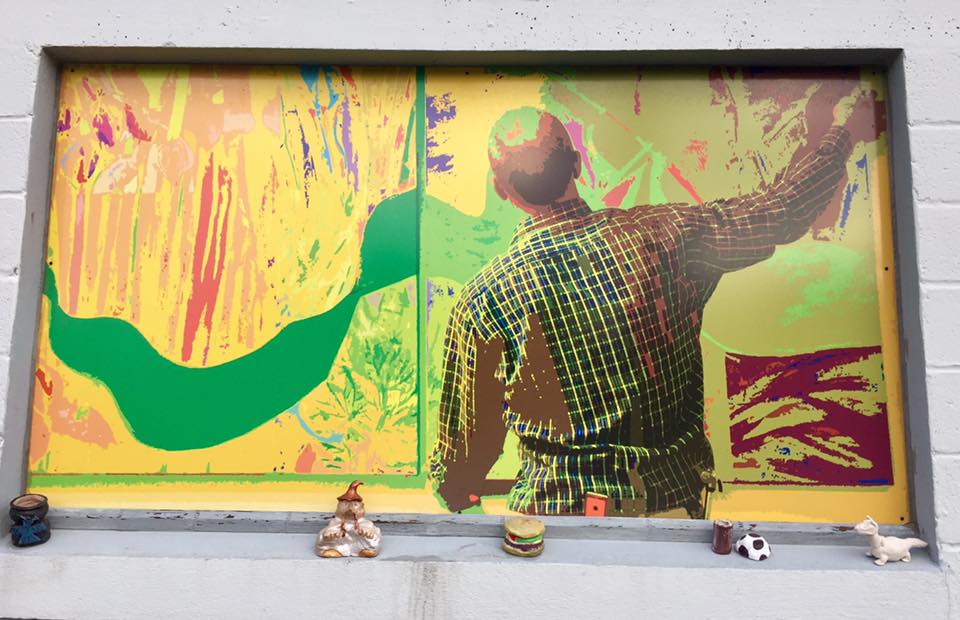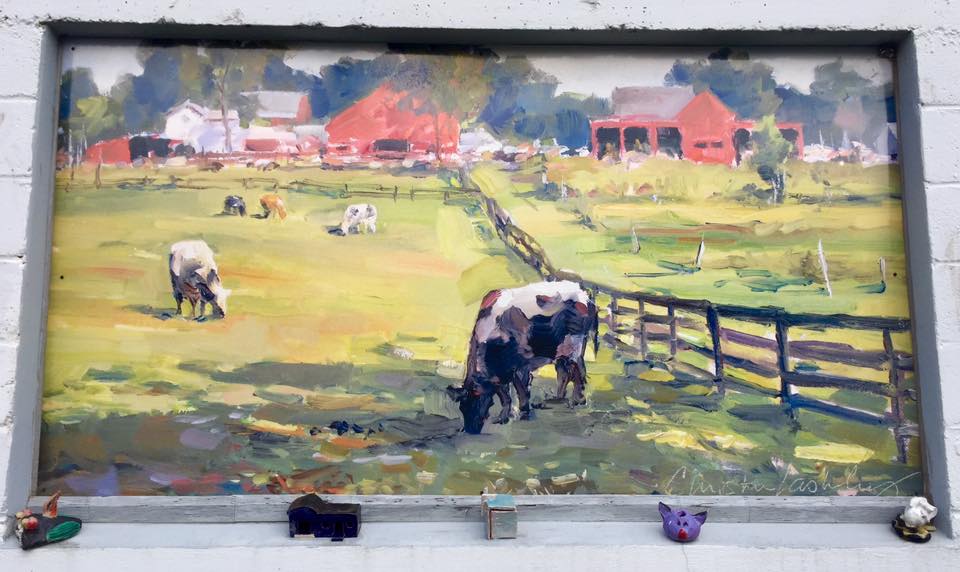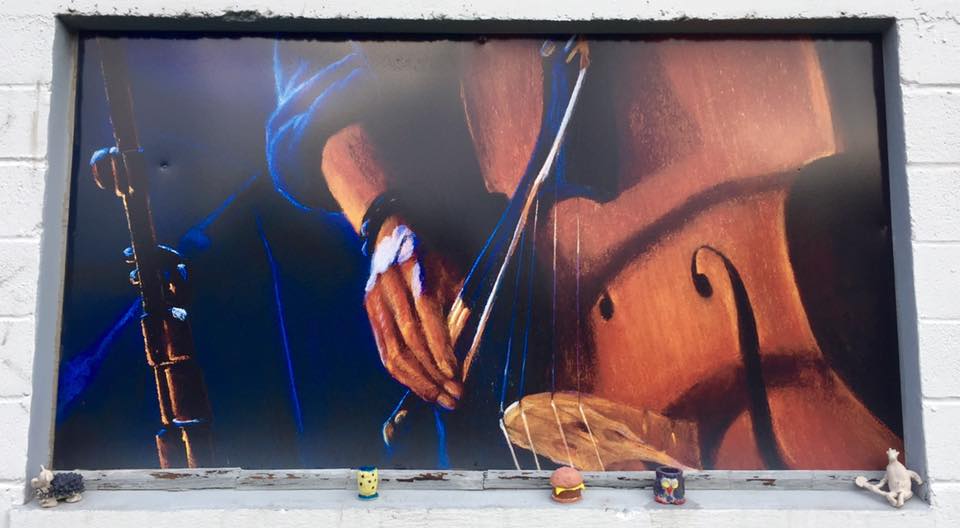^zhurnaly 0.9928

Howdy, pilgrim! No ads — you're in volume 0.9928 of the ^zhurnal (that's Russian for "journal") — see ZhurnalyWiki for a Wiki edition of individual items; see Zhurnal and Zhurnaly for quick clues as to what this is all about; see Random for a random page. Briefly, this is the diary of ^z = Mark Zimmermann ... previous volume = 0.9927 ... complete list at bottom of page ... send comments & suggestions to "z (at) his (dot) com" ... click on a title link to go to that item in the ZhurnalyWiki where you can edit or comment on it ...
RSS
~13.5 miles @ ~15.4 min/mi
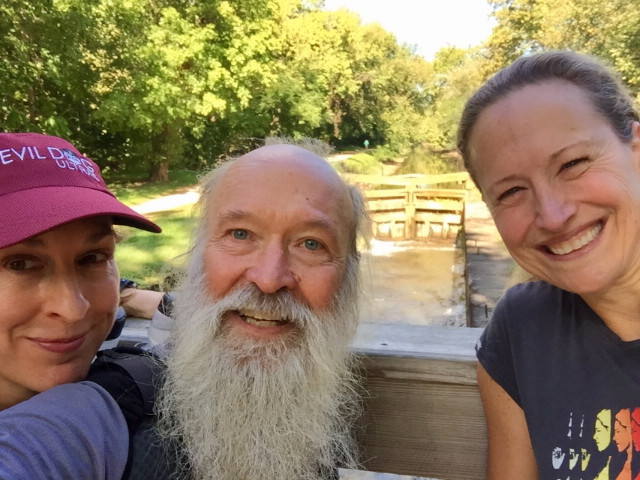 | "Don't follow me - I'm a contrary indicator!" Dawn Patrol members take turns leading one another off-course along Muddy Branch Trail. Boggy swales and forking paths make that name singularly apt for today's area familiarization reconnaissance, prep for the Stone Mill 50 miler in November. Tributary streams are low and we manage ~13 miles with barely-wet feet, walking the climbs and jogging on the flats and downhills. The sky is crystal blue. Temperatures are delightfully crisp. Sunbeams slice between trees. "Chipmunk!" - "Deer!" - "Horse!" Everybody else spots wildlife; my only sightings are a dead possum (pointed out first by Stephanie) and a dead snake (ditto by Kerry). Friendly local trekker Kevin Gray introduces himself as he walks his dog, a chocolate Lab hybrid. We share good memories of past runs here, along with family news and hair style tips. (OK, two out of three of us do that!) Polite cyclists swoop past at our road crossings. Trail talk is wide-ranging and compassionate. Often it's so hard to help each other in this life, yet that's our prime mission. "Oops!" Kerry stumbles over a root at mile 12, almost recovers, then falls on hands and knees - thankfully without major damage. "Sally is complaining!" at mile 10, Stephanie reports her ankle tendon is twinging. We pause for photos and walk the final stretch to Pennyfield Lock (aka Lock 22) on the C&O Canal. Such a lovely day to ramble with friends! |
(trackfile)
- Sunday, October 08, 2017 at 06:00:08 (EDT)
~16.1 miles @ ~13.8 min/mi
"You're the epitome of Frictional Employment!" Dr Kristin remembers a long-ago comment from her brother. (Was it an insult? What does it mean?) We join Dr Kerry and ramble with her for half a dozen miles. Six deer stand nibbling backyard grass. Lovely mansions - old, new, and under construction - pose the question: do their owners feel wealthy, or does the top 1% compare itself to the top 0.1% and feel poor? Backpack-laden kids slouch toward high school. The scent of marijuana lingers along a pathway between neighborhoods.
"Good morning!" says a well-dressed elderly gentleman, who takes a bent calabash pipe out of his mouth as we pass by. At McLean High we laugh at a spelling error on the parking sign ("PRIVELEDGE"?), then find ourselves trapped by a locked gate. Fire hazard? A front-yard sign, featuring an American flag motif, celebrates diversity and tolerance. We meander on the home stretch to add extra distance. Weather is cool, crisp, comfy. Good friends are so awesome to be with!
(trackfile)
- Saturday, October 07, 2017 at 05:46:04 (EDT)
~5.7 miles @ ~13.7 min/mi
"He cheated and attached the raw egg to the spoon with a rubber band!" Kerry reveals the secret of the policeman who won the high-heels race at her sister's recent charity fundraiser. The firemen never showed up to run! Kristin's headlamp gets the Dawn Patrol safely to Starbucks for iced coffee, after which thick clouds grudgingly begin to brighten. A fox crosses the street. School buses back up and turn around as new drivers learn their routes. The impressive front yard garden last seen two months ago is still beautiful. (cf. 2017-07-07 - Pine Hill Connection)
(trackfile)
- Saturday, October 07, 2017 at 05:42:49 (EDT)
... a promise of loyalty: to protect, to serve, to share, to love ... beautifully sung by Rachel Platten in "Stand by You":
Hands, put your empty hands in mine
And scars, show me all the scars you hide
And hey, if your wings are broken
Please take mine so yours can open, too
'Cause I'm gonna stand by you
Oh, tears make kaleidoscopes in your eyes
And hurt, I know you're hurting, but so am I
And, Love, if your wings are broken
Borrow mine 'til yours can open, too
'Cause I'm gonna stand by you
Even if we're breaking down, we can find a way to break through
Even if we can't find heaven, I'll walk through Hell with you
Love, you're not alone, 'cause I'm gonna stand by you.
(cf. Four Mantras (2014-06-26), ...)
- Friday, October 06, 2017 at 04:52:05 (EDT)
~14.1 miles @ ~13.7 min/mi
"Hey! You kids can't come through here! Go away!" Ken and Emaad shout affectionately. They emerge from the cut-through near the start of the Georgetown Branch Trail, soon to be closed for Purple Line Metro construction. Sako and I are at our mile 9, enjoying a Labor Day holiday ramble. We pause for photos at the train track overpass, the high trestle over Rock Creek, and milepost Zero for the Capital Crescent Trail.
"Let's run the Rabbit Road!" suggests Sakurako. So from Bethesda we challenge the hills of Leland, and are rewarded with two big bunnies. We cross over the one-lane Talbot St bridge to Sligo Creek and run to Barry's home, ring the doorbell, hide, take a selfie to prove we were there, and head for home. One final detour around a neighborhood pool gets Sako her mileage goal.
(trackfile)
- Thursday, October 05, 2017 at 06:48:53 (EDT)
What is the branch of mathematics called "Category Theory" all about? From the introduction, titled "Please read this", of Conceptual Mathematics: A First Introduction to Categories by F William Lawvere and Stephen Hoel Schanuel:
We all begin gathering mathematical ideas in early childhood, when we discover that our two hands match, and later when we learn that other children also have grandmothers, so that this is an abstract relationship that a child might bear to an older person, and then that 'uncle' and 'cousin' are of this type also; when we tire of losing at tic-tac-toe and work it all out, never to lose again; when we first try to decide why things look bigger as they get nearer, or whether there is an end to counting.
As the reader goes through it, this book may add some treasures to the collection, but that is not its goal. Rather we hope to show how to put the vast storehouse in order, and to find the appropriate tool when it is needed, so that the new ideas and methods collected and developed as one goes through life can find their appropriate places as well. ...
(cf. Cakes, Custard, and Category Theory (2016-02-14), Category Theory Concepts (2016-04-25), Bird's-Eye View (2016-07-20), Category Theory for Programmers (2017-05-12), Ultimate Abstraction (2017-08-24), ...)
- Wednesday, October 04, 2017 at 04:49:50 (EDT)
~24.1 miles @ ~14.8 min/mi
| "We've run by the homes of Gayatri and Ken and John — how about visiting the White House next?" suggests Dr Stephanie, who knows how to turn a neighborhood trot into true adventure! So instead of heading east to meet Barry in Rock Creek Park we continue on the Capital Crescent Trail. (Barry is ok with that; text messages confirm that he's ahead of us and on his way home.) Five big deer lurk in Kensington, along with one shy rabbit. We inspect portajohns on the Bethesda Trolley Trail; they pass. "It's Santa!" shouts a spectator as we navigate through Bethesda. Cheerful Patti Rich and Julie Trapp greet us; Tim, newbie to the area, introduces himself. The CCT is dense with cyclists hunched low over handlebars. (Are the accents in "décolleté" grave or aigu?) | 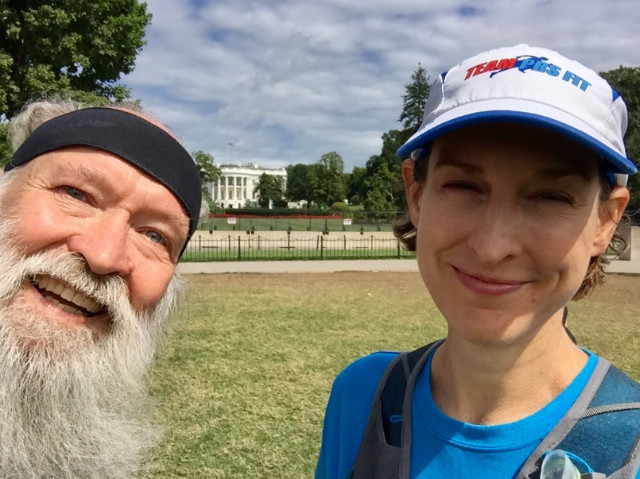 |
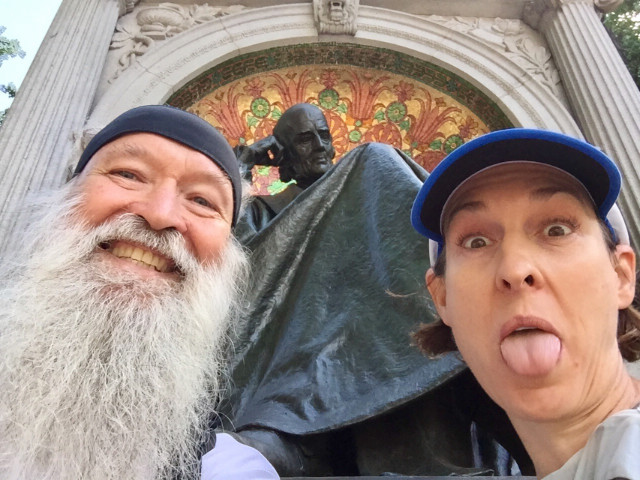 | "Watch out for friendly snakes — don't run over them!" I beg a young biker whose father is warning him about poisonous species. "Sally" (aka Stephanie's bane, an inflamed ankle tendon) starts to complain after a dozen miles. We slow our pace and pause for photos at downtown DC sights. Labor Day weekend tourists block sidewalks. The Zero Milestone is fenced off — is it threat, or threatened? "May we stop at a taco truck?" I beg, eyeing the ice cream offerings. But Dr Fonda says no, alas, so memories of soft pink pillows too magical to touch and cute French bulldogs must suffice. Northbound on 16th Street we pause at the Samuel Hahnemann Monument, dedicated to the inventor of homeopathy. A few miles later we come to our senses and summon a Lyft. Stephanie's GPS reads 20+ miles, and including the jog to her home mine says 24. Shared splendid trail talk makes for a delightful day! |
(trackfile)
- Tuesday, October 03, 2017 at 06:06:19 (EDT)
From Part I Chapter VII of E M Forster's Passage to India, a magical-lyrical-mystical-loving description of a Hindu religious song:
His thin voice rose, and gave out one sound after another. At times there seemed rhythm, at times there was the illusion of a Western melody. But the ear, baffled repeatedly, soon lost any clue, and wandered in a maze of noises, none harsh or unpleasant, none intelligible. It was the song of an unknown bird. Only the servants understood it. They began to whisper to one another. The man who was gathering water chestnut came naked out of the tank, his lips parted with delight, disclosing his scarlet tongue. The sounds continued and ceased after a few moments as casually as they had begun—apparently half through a bar, and upon the subdominant.
"Thanks so much: what was that?" asked Fielding.
"I will explain in detail. It was a religious song. I placed myself in the position of a milkmaiden. I say to Shri Krishna, 'Come! come to me only.' The god refuses to come. I grow humble and say: 'Do not come to me only. Multiply yourself into a hundred Krishnas, and let one go to each of my hundred companions, but one, O Lord of the Universe, come to me.' He refuses to come. This is repeated several times. The song is composed in a raga appropriate to the present hour, which is the evening."
"But He comes in some other song, I hope?" said Mrs. Moore gently.
"Oh no, he refuses to come," repeated Godbole, perhaps not understanding her question. "I say to Him, Come, come, come, come, come, come. He neglects to come."
Ronny's steps had died away, and there was a moment of absolute silence. No ripple disturbed the water, no leaf stirred.
- Monday, October 02, 2017 at 05:02:02 (EDT)
~7.7 miles @ ~13.8 min/mi
"Why can't we be this funny when other people are with us?" Maybe it's a quantum-mechanical observer-wavefunction paradox. The Two and Only, aka Barry and Mark, exchange brilliant banter as remnants of Hurricane Harvey send bands of showers across the area.
"As I told Lance and Wardian, you've just gotta man up and run through the pain!" - "Are you sure you weren't dry needling them?" On the trail to Bethesda we discuss light-bending in Einstein's General Relativity (twice as much as Newtonian gravity) and observations by Sir Arthur Eddington of a 1919 solar eclipse. (Footnote: Barry stresses the first syllable of "eclipse", as I do "cement". Hmmmm!) Then it's time to return to analysis of scary scenes in the "Alien" film series, with vulnerable folks wandering about in their underwear. A soggy bunny hunkers down on hilly Leland Street.
"Moose Drool and Icky Pale Ale!" recommends Barry. "They're so good, I can't drink a lager any more." At Rays Meadow Park a pair of brightly colored baby shoes pose for pics by the playground. On the high trestle above Rock Creek fast young runners kindly pause to take photos of us. They admire my Marathon Maniacs singlet and admit to sub-3-hour marathon PRs. Barry confesses to being the Maryland Ambassador for the Maniacs. Raindrops falling on the phone's touch-screen trigger Burst Mode. Oops!
(trackfile)
- Sunday, October 01, 2017 at 15:39:36 (EDT)
Do Finite Things
in an
Infinite Way |
... a reminder to transcend, from Chapter 15 ("Peace of Mind") of Subtle Sound: The Zen Teachings of Maurine Stuart:
... the experience and the experiencer disappear. And the disappearance of these two is their spontaneous coming together, through which we experience the One. In deep samadhi, our zazen is nothing but this oneness: gateless gateness. It is nothing but inner and outer, in-breath and out-breath, just this.
Life is suffering, the Buddha taught, because we want some permanency, some guarantee. If we let go of this desire and just follow a path of doing finite things in an infinite way, then ordinary becomes extraordinary; secular is sacred. Preparing the food, washing the dishes; everything is a sacred act.
This path must be followed without any shortcuts. Unlike instant coffee, enlightenment isn't bought in a jar. ...
(cf. This (2013-03-09), How to Wake Up (2016-11-11), Finite Things in an Infinite Way (2016-12-16), Just Breathing, Just Being, Just This (2017-04-03), ...)
- Thursday, September 28, 2017 at 05:45:34 (EDT)
~26.0 miles @ ~13.9 min/mi
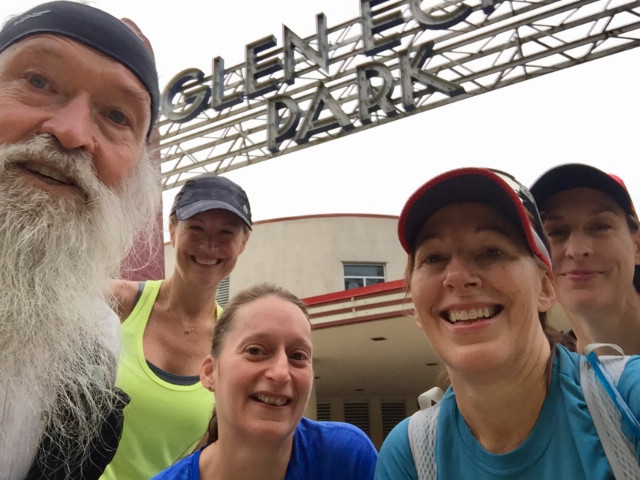 | "Was that 11 or 12 Great Blue Herons? I've lost count!" Today's trek is creature-rich. On the C&O Canal towpath before sunrise 5 deer stand caught in the glow of Eileen's headlamp, eyes gleaming emerald-green. Later in the morning 4 more feed close by the trail, and another stands in the shallow waters of the canal itself. A huge turtle surfaces and submerges, leaving a growing circle of ripples. "Jill lives nearby? Let's go knock on her door!" Kristin and Kerry know her address — well, more-or-less. We climb the wooden stairs, cross bridges over canal and parkway, take the steep rocky path up to Macarthur Blvd, and trot across the 150-year-old Union Arch Bridge that carries the Washington Aqueduct. After trying one side street without success, we text Jill who emerges at the next block and leads us to her home. We meet her cheery son Evan and energetic dachshund Pippi. Surprise! |
| Jill gives us directions back to the towpath via 79th St and Riverside Dr to Lock 8. We ramble downstream and soon are back at the Theodore Roosevelt Island parking lot where the journey began at 0540. Eileen was promised 15 miles — she got almost 19. Not bad! Kerry must dash off for a family visit but could have run more. To raise her total into the 20's Kristin leads Stephanie and me around TR Island (where we spy yet another Great Blue Heron), then rushes away to start a Friday afternoon of meetings. "Gravelly Point!" Dr Fonda prescribes a few more miles to treat her twingy tendon, so down the Mount Vernon Trail we go. Aircraft taking off from National Airport provide another selfie opportunity. Today's 25+ mile mission accomplished! | 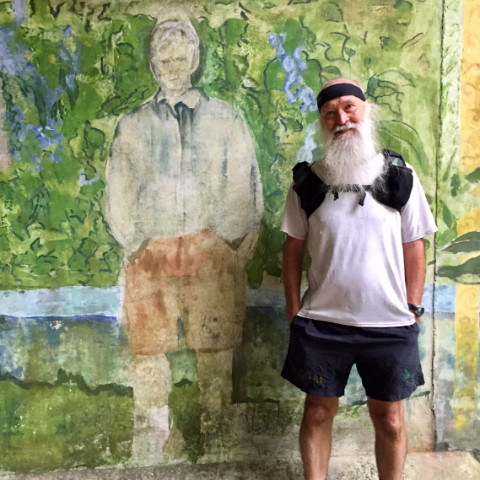 |
(trackfile)
- Tuesday, September 26, 2017 at 05:29:08 (EDT)
A lovely Welsh word to describe a cozy zone, a snuggery, a space for holding and hugging, and also the act of cuddling itself — described nicely in an essay from almost a decade ago in a long-abandoned blog "The Cwtch":
... "Cwtch" is one of my favourite words. It is a word of my childhood which only has wonderful connotations. It is a welsh word which has a number of meanings all of which are warm and full of love. It is pronounced kutch (rhymes with butch).
A cwtch is a small cosy place, a snug: in my nana's house, a miners cottage in the south wales valleys, the cwtch is a long kind of cupboard which fills the space under the stairs. It is her larder with shelves floor to ceiling, which was, in my young eyes, full of marvelous treasures ... mysterious tins and the best treasure of all — the button box. I would be allowed to bring the button box out and tip the contents on the carpeted floor in the lounge, the next hour or so would be spent sorting by size, by shade, by preference. The box was a myriad of treasures — pearl buttons, wooden buttons, pretty buttons from dolls clothes, large buttons from coats ... wonderful. The cwtch also contained a number of items which had belonged to my grampy, whom I never met. These items — an old camera, his binoculars and a money box with combination lock were particularly revered. I remember spending days and days trying to work out the combination for the box, I eventually managed it and was so pleased to have established a link with my long passed grampy.
"Cwtch" also has another meaning. It is another kind of small place, it is the act of creating a small space between you and another. It is like a hug ... but much much better! There are degrees of cwtching. To "cwtch-up" is to snuggle up with someone, particularly lovely on a cold welsh winters night. There is just a plain old "cwtch" much like a hug (but better), and then theres "a-big-cwtch", now "a-big-cwtch" is something special, it is a "cwtch" but with extra gusto, it's the kind of cwtch you give when you haven't seen a loved one in years, it's the kind of cwtch where you squeeze with all your might. What's wonderful about cwtches is they reach out, and they engage with feeling. ...
- Monday, September 25, 2017 at 04:48:36 (EDT)
~8.0 miles @ ~12.0 min/mi
'Gymnastics moms are so judgy!" says Cait, describing her five-year-old niece's class yesterday. Kristin leads us through Tysons Corner at a brisk pace on a cool morning. Since Kerry is out of town we consider diverting to TP her home, but decide that with only two squares of paper between us the effect might be aesthetically lacking. A crowd of kids await their bus on the first day of school and cheer us as we pass.
(trackfile)
- Sunday, September 24, 2017 at 05:49:58 (EDT)
From Part I Chapter V of E M Forster's Passage to India, where Mrs Moore is speaking to her son on the importance of lovingkindness and its Name, "God":
"... India is part of the earth. And God has put us on the earth in order to be pleasant to each other. God . . . is . . . love." She hesitated, seeing how much he disliked the argument, but something made her go on. "God has put us on earth to love our neighbours and to show it, and He is omnipresent, even in India, to see how we are succeeding."
He looked gloomy, and a little anxious. He knew this religious strain in her, and that it was a symptom of bad health; there had been much of it when his stepfather died. He thought, "She is certainly ageing, and I ought not to be vexed with anything she says."
"The desire to behave pleasantly satisfies God. . . . The sincere if impotent desire wins His blessing. I think everyone fails, but there are so many kinds of failure. Good will and more good will and more good will. Though I speak with the tongues of . . ."
He waited until she had done, and then said gently, "I quite see that. I suppose I ought to get off to my files now, and you'll be going to bed."
"I suppose so, I suppose so." They did not part for a few minutes, but the conversation had become unreal since Christianity had entered it. Ronny approved of religion as long as it endorsed the National Anthem, but he objected when it attempted to influence his life. Then he would say in respectful yet decided tones, "I don't think it does to talk about these things, every fellow has to work out his own religion," and any fellow who heard him muttered, "Hear!"
Mrs. Moore felt that she had made a mistake in mentioning God, but she found him increasingly difficult to avoid as she grew older, and he had been constantly in her thoughts since she entered India, though oddly enough he satisfied her less. She must needs pronounce his name frequently, as the greatest she knew, yet she had never found it less efficacious. Outside the arch there seemed always an arch, beyond the remotest echo a silence. ...
- Saturday, September 23, 2017 at 06:46:15 (EDT)
~20.1 miles @ ~12.2 min/mi
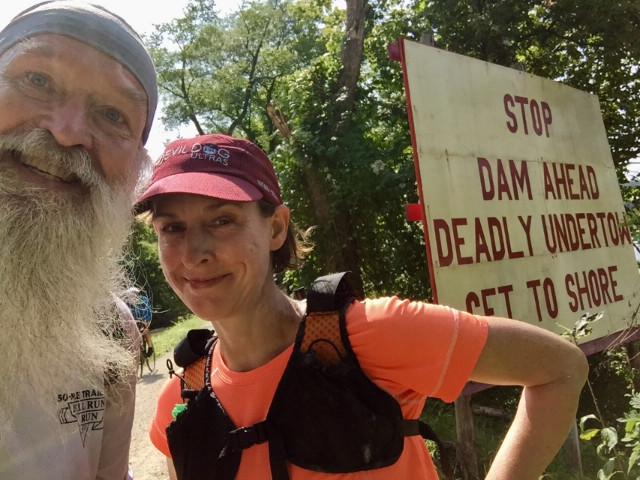 | "I've got a mule and her name is Sal / 15 miles on the Erie Canal!" Dr Fonda dubs her achy ankle tendon "Sally", and I get an instant flashback to 2nd grade singalong time. "You'll always know your neighbor / You'll always know your pal / If you've ever navigated on the Erie Canal!" Or in our case, the C&O Canal. We begin at Lock 7 and trot upstream, passing hikers and stepping aside for cyclists. Fishermen cast lines into the water. Three kayakers cross a bridge carrying boats on their backs. "Intervals. FORTY intervals!" Stephanie describes our pacing plan today: run-0.4 miles; walk-0.1 miles; repeat. Sore tendon Sal and my twingy hip adductor (codename "Addie"?) feel surprisingly good after yesterday's long ramble. "Slow down now — I have to catch my breath!" A pack of fleet-footed easy-on-the-eyes young Georgetown runners zooms by; we need time to recover. At the Carderock Division of the Naval Surface Warfare Center the "Star Spangled Banner" sounds out. Just past milepost 13 we reverse course and return, refuel, and resume the trek downstream into DC. A huge Great Blue Heron perches on a log; a giant catfish sashays along in the shallows leaving a muddy contrail behind. We pause for a photo by the "Deadly Undertow" sign. Stephanie's plan to walk the final 4 miles goes by the wayside as we feel good and keep on trucking, significantly faster than planned. "Ankle or knee injury!" says the medic. A cluster of canal patrol first-responders surround somebody lying by the path. An ambulance idles, lights flashing, in the parking lot as we finish our run. Hope whoever got hurt is soon OK! |
(trackfile)
- Friday, September 22, 2017 at 04:40:53 (EDT)
Jane Brody's New York Times column of 2017-04-03, "Turning Negative Thinkers Into Positive Ones", suggests some routes toward building a healthier, happier, more productive mind:
- Do good things for other people — In addition to making others happier, this enhances your own positive feelings. ...
- Appreciate the world around you — It could be a bird, a tree, a beautiful sunrise or sunset or even an article of clothing someone is wearing. ...
- Develop and bolster relationships — Building strong social connections with friends or family members enhances feelings of self-worth and, long-term studies have shown, is associated with better health and a longer life. ...
- Establish goals that can be accomplished — Perhaps you want to improve your tennis or read more books. But be realistic; a goal that is impractical or too challenging can create unnecessary stress.
- Learn something new — It can be a sport, a language, an instrument or a game that instills a sense of achievement, self-confidence and resilience. But here, too, be realistic about how long this may take and be sure you have the time needed.
- Choose to accept yourself, flaws and all — Rather than imperfections and failures, focus on your positive attributes and achievements. The loveliest people I know have none of the external features of loveliness but shine with the internal beauty of caring, compassion and consideration of others.
- Practice resilience — Rather than let loss, stress, failure or trauma overwhelm you, use them as learning experiences and steppingstones to a better future. Remember the expression: When life hands you a lemon, make lemonade.
- Practice mindfulness — Ruminating on past problems or future difficulties drains mental resources and steals attention from current pleasures. Let go of things you can't control and focus on the here-and-now. ...
(cf. Optimist Creed (1999-04-06), Don't Panic (2010-11-17), Thirty Things (2013-10-01), Happiness Buffer (2013-12-22), Habits of Unhappy People (2014-03-11), Negative Thinking Patterns (2015-08-28), Cognitive Distortions (2015-09-28), Mental Toughness (2015-12-06), Power of Optimism (2016-02-23), Mantra - Be on Good Form (2016-05-10), Sheryl Sandberg on the Hard Days (2016-05-22), ...)
- Thursday, September 21, 2017 at 05:46:31 (EDT)
~25.3 miles @ ~13.8 min/mi
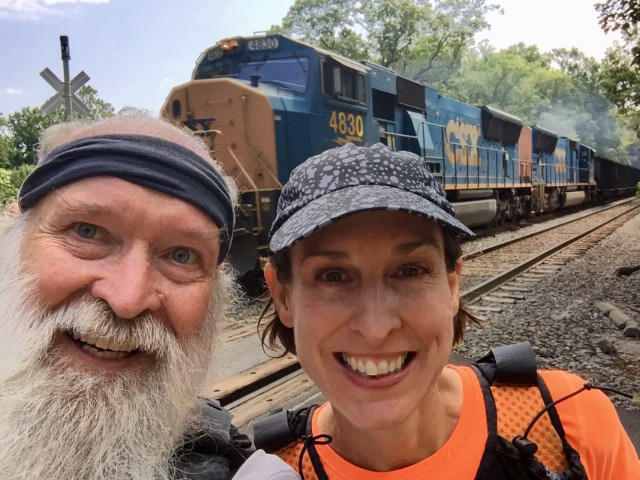 | "It would be a bit radical if we ...", Dr Fonda begins her suggestion of a new route, then pauses and smiles. She knows that using the word "radical" is like throwing chum to a shark whenever I hear it. Irresistible and inevitable: adventure beckons! We're already several miles out from Stephanie's home, having diverted to snag iced coffee at Quatermain's and then run a lap around the Walter Johnson HS track. "Westward ho!" now, on Democracy Boulevard from Seven Locks Road. A mile later as we pass the USPS Bolger conference facility suddenly I realize where we are. "Emaad lives nearby!" I exclaim. "Let's visit him!" A few years ago he led Barry and Ken and me around his 'hood (see 2015-01-19 - Bolger Center). Alas, memory is hazy as to the proper route; Stephanie and I soon find ourselves dancing along the narrow shoulder of Falls Road, leaning out as cars speed past. Eventually local streets and a woodsy cut-through get us safely to Stately Burki Mansion. Alas, no answer to the doorbell. Maybe the butler is napping? "Dur-YEAH!" Stephanie echoes Google Map's pronunciation of Duryea Drive as we navigate to Tuckerman Lane. Winston Churchill HS track offers the dynamic duo another chance to run a lap, along with a welcome water fountain. The bulldog school mascot reminds Stephanie of Louis, her dear Frenchie. On the home stretch we run a lap at Tilden Middle School as three ladies practice yoga and then start strength work. At 7-11, Gatorade and a Slurpee; at Garrett Park Station, a freight train. Today's tarot card is the Two of Cups: "Friendliness", the perfect description of a glorious trek with a dear trail comrade. Thank you, Stephanie! |
(trackfile)
- Wednesday, September 20, 2017 at 04:54:56 (EDT)
| In the movie Master and Commander, a beautiful scene worth remembering of people caring for each other: young Will Blakeney has had his arm shot off and is recovering from the amputation. Captain Jack Aubrey visits him and gives him a book about Vice Admiral Horatio Lord Nelson, British naval hero. After Captain Aubrey leaves the depressed boy is flipping through the book, which falls open to an illustration of Lord Nelson — who also was wounded in battle and lost an arm. What a lovely way to console someone suffering and in need! (OK, ignore the fact that everyone of that place and time would already know about Nelson's injury!) | 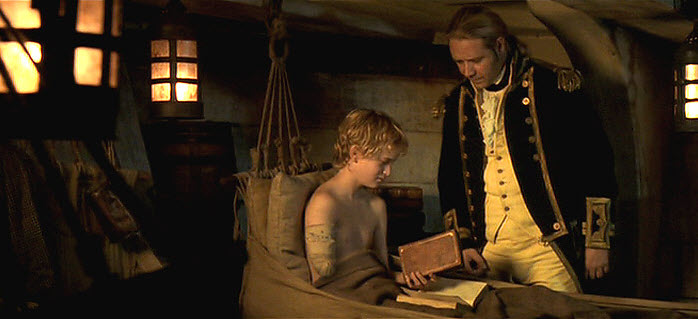 |
(cf. MasterAndCommander (2005-03-04), PostCaptain (2006-10-12), OnTheShore (2006-11-07), ExtremeClarity (2006-12-15), Master and Commander, Lars and the Real Girl (2011-07-05), ...)
- Tuesday, September 19, 2017 at 06:13:18 (EDT)
~5.1 miles @ ~12.8 min/mi
"Fox?" Hawk-eyed Kristin glimpses the creature trotting along the sidewalk ahead of us in the gloom. It pauses to look back, ambles another block, turns down a driveway, and vanishes. Clouds low in the east begin to thin as dawn brightens. Humidity is high, Dr K is recovering from a bad cold, and we appreciate intermittent breezes on a quiet morning. The path through Tysons Pimmit Park is newly repaved, wide and smooth. A motorcycle starts and cruises loudly away from a confederate-flag-decorated bungalow. Rabbit count = 1. In the parking lot we observe an eclipse — a sporty Mitsubishi Eclipse automobile, that is.
"Now I know where we are!" — "Yes, right here!"
(trackfile)
- Monday, September 18, 2017 at 04:29:35 (EDT)
~5.2 miles @ ~11.8 min/mi
"On the third call I got the answer I wanted, so I stopped asking then!" Cait explains how she successfully rescheduled a family trip with a less-than-organized resort. The Dawn Patrol sets out on a gloomy humid morning, loops through Pimmit Hills, and concludes its survey just as a crimson sun begins to peek through the treeline. Pace is brisk, ~5.2 mi @ ~11.8 min/mi. We discuss family political arguments, dangerous ground to tread at a reunion. "They misunderestimated the problem!" is the verdict.
(trackfile)
- Monday, September 18, 2017 at 04:27:15 (EDT)
From Chapter XXVIII of Howards End by E M Forster, on how the sexes are different and the same:
And yet—what could an explanation tell her? A date, a place, a few details, which she could imagine all too clearly. Now that the first shock was over, she saw that there was every reason to premise a Mrs. Bast. Henry's inner life had long laid open to her—his intellectual confusion, his obtuseness to personal influence, his strong but furtive passions. Should she refuse him because his outer life corresponded? Perhaps. Perhaps, if the dishonour had been done to her, but it was done long before her day. She struggled against the feeling. She told herself that Mrs. Wilcox's wrong was her own. But she was not a barren theorist. As she undressed, her anger, her regard for the dead, her desire for a scene, all grew weak. Henry must have it as he liked, for she loved him, and some day she would use her love to make him a better man.
Pity was at the bottom of her actions all through this crisis. Pity, if one may generalise, is at the bottom of woman. When men like us, it is for our better qualities, and however tender their liking, we dare not be unworthy of it, or they will quietly let us go. But unworthiness stimulates woman. It brings out her deeper nature, for good or for evil.
Here was the core of the question. Henry must be forgiven, and made better by love; nothing else mattered. Mrs. Wilcox, that unquiet yet kindly ghost, must be left to her own wrong. To her everything was in proportion now, and she, too, would pity the man who was blundering up and down their lives. Had Mrs. Wilcox known of his trespass? An interesting question, but Margaret fell asleep, tethered by affection, and lulled by the murmurs of the river that descended all the night from Wales. She felt herself at one with her future home, colouring it and coloured by it, and awoke to see, for the second time, Oniton Castle conquering the morning mists.
(cf. Women and Men (2001-11-20), Ingressive vs Congressive (2017-07-08), ...)
- Sunday, September 17, 2017 at 03:47:37 (EDT)
~25.6 miles @ ~14.3 min/mi
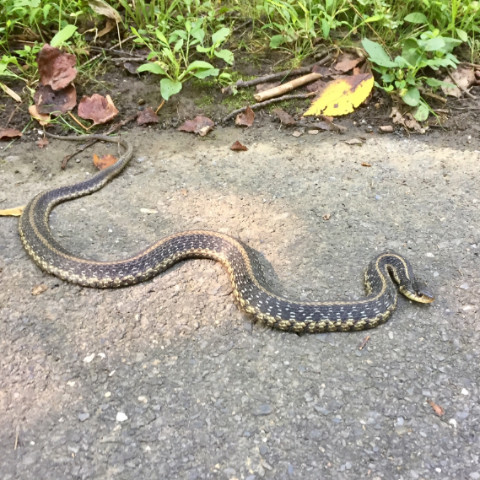 | "As a Frequentist, ...", Dr Fonda prefixes her comment. Is she testing whether a devout Bayesian will keep running with her? (P > 0.95 he will.) We're enjoying the shady quiet along Rock Creek Trail on a warm and humid summer day. Bicycles swoop past, most giving courteous warning. Green soccer fields swarm with yellow-and-red uniformed players. A spectator sips her drink by a stump in the shade nearby. "Snake! Is it hurt?" We pause to inspect a black serpent lying on the path, fearful that a runner or cyclist has already injured it. As Stephanie prepares to slide it off the asphalt it sticks its snaky tongue out at us and slithers into the grass. Whew! Mindful trail talk focuses on issues of honesty and respect, especially for those who have long been dominated and abused. How much can and should they forgive? Tough questions for personal relationships and society writ large. We turn back short of Lake Needwood and walk much of the return trip — good ultra training! In the home stretch kind neighbor Greg introduces himself, sets a healthy pace, reveals that he's started training again 20 years after his last NYC Marathon, and acts appropriately impressed when the GPS announces mile 25. Great to meet you, Sir! |
(trackfile)
- Saturday, September 16, 2017 at 09:30:42 (EDT)
Another discussion of "Mnemonic Principles of Taiji", this one with additional comments, appears in the essay "What Is T'ai Chi?":
The Five Tai Chi Principles
Relax ~ Be Soft
Relaxation is the first and foremost principle. Not at all weak or limp nor tight and stiff, this is an alert, vibrant condition that promotes fluid gracefulness while enhancing sensitivity, a prime requirement in our world of constant change. T'ai Chi coaxes the body into loosening and opening so that internal energy may flow freely. Blood circulation is enhanced as the capillaries open, for example. Tension is a blockage resulting from stress and/or trauma. Regular practice with mental concentration provides early recognition and amelioration of physical and mental tension.
Keep the Body Upright ~ The Straight Spine ~ Do Not Lean
Verticality of the spine is another important principle. Leaning even slightly in any direction means tensing the body in a losing battle with gravity. The top of the head is kept horizontal and the spine upright and open so the muscles along the spine may relax. The spine is a major energy path that deserves close attention. After the common cold, back pain is the most frequent ailment reported and it is often caused by tension due to poor posture. Mother was on to something when she said, "Sit up straight!"
Turn the Waist ~ Do Not Twist the Spine
The center leads the movement of the energy and the body. The waist area just below the navel is the central axis or hub of the body and the limbs may be thought of as spokes. Paying attention to the center on the physical level gradually leads to the meditative aspect of T'ai Chi as well. Breathing is deepened and enhanced by concentrating on the center.
Yin and Yang ~ Separate Weight ~ Empty and Full
Differentiate yin and yang and perceive substantial and insubstantial. Initially, this means to separate the weight completely in the legs. T'ai Chi is called one-legged boxing because of this emphasis on standing on one leg at a time. Obviously, this builds strength and balance. Gradually, one becomes more sensitive to other differentiations as well.
The Beautiful Lady's Hand
Beautiful Lady's Hand refers to a straight and relaxed wrist. During the form, the wrist is almost always straight in order to enhance the flow of energy. If a soda straw, for example, is bent or twisted, the flow through it is reduced. Precision of wrist position also requires concentration and practice to attain and thus builds awareness.
...and then a final comment:
Anyone Can Do It
If one were to follow the five principles only, they'd be doing the Form 80% correct. These principles are from the classics. Don't think "I can't do it." This is not true. Anyone can do four of the five principles, all except Relax. If you could Relax, then you would not need the other principles.
(cf. "Principles of the Cheng Man-Ch'ing Simplified Yang Style Tai Chi Chuan" Mnemonic Principles of Taiji (2014-03-24), ...)
- Friday, September 15, 2017 at 03:52:26 (EDT)
~14.7 miles @ ~13.2 min/mi
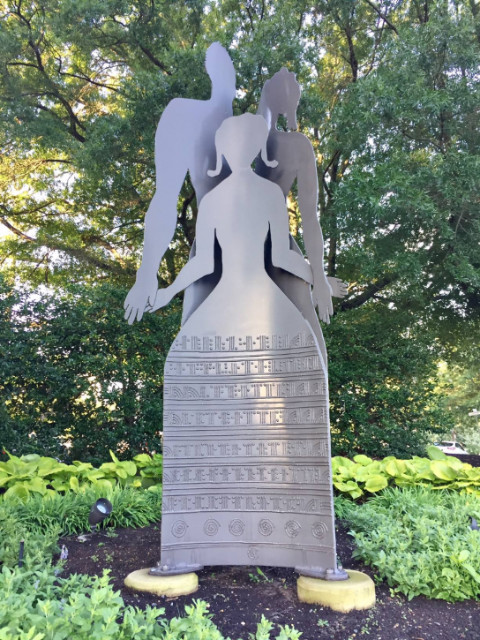 | "I've partied there!" someone remarks as we pass a stately mansion on a hill. Today's "Spontaneous Adventure Run" begins at 0622 on a warm, humid morn. A wee bunny races along the path, then darts into a church cemetery. The waning crescent moon prepares to eclipse the sun. Rick's Tattoo Parlor provides a selfie op. We snag iced coffee, then take a memory-lane detour past the someday-historical home where Kerry's kids were born. Flashing lights atop a tall radio tower nearby soothed her infant son when he was fretful at night. "The Family", a neighborhood sculpture by local artist Winnie Owens-Hart, features braille that reads "HALLS HILL HIGH VIEW PARK - AFRICAN AMERICAN FAMILIES ARE OUR HISTORICAL FOUNDATION". Trail talk includes more sweet memories of our babies, the mantra "Do Less, Better", sympathies for suffering the first-world challenge of obligatory working-dinners almost every night of the week, the recent film "Free Fire", and upcoming birthday & anniversary celebrations. |
(trackfile)
- Thursday, September 14, 2017 at 06:05:40 (EDT)
... together, as one, it will turn out OK — no worries!
(cf. Mantra - No Others (2016-06-27), We Are One (2017-07-22), ...)
- Wednesday, September 13, 2017 at 04:55:48 (EDT)
~6.9 miles @ ~13.0 min/mi
"Hawk!" says Cait. The big bird perches above us in a scruffy pine tree overhanging Brawner St, then takes wing and soars away. Eagle-eyed Kristin has already spotted two rabbits in the gloom. We see a third on the way back. Morning is gray and hyper-humid, temperature and dew point both in the upper 70s.
"Don't curse the nurse!" — good advice for hospital patients, from someone with recent experience. We divert to cool down in a lawn sprinkler's spray, and moments later it cuts off. "Was it on a timer, or did somebody see vagabonds invading their turf?"
(trackfile)
- Tuesday, September 12, 2017 at 05:31:17 (EDT)
~11.2 miles @ ~13.0 min/mi
"Sweet tea? You don't like sweet tea? What's wrong with you?" Kristin quotes an incredulous Southerner she met on a business trip, as I rehydrate at a mile 6 McDonalds with that classic beverage. Lavender clouds greet the Dawn Patrol on a muggy Monday morning. Kerry reports on results of a weekend pony jumping competition.
"DATA IS THE NEW BACON" reads the t-shirt of a woman who cheers us as we pass her. "Shouldn't that say DATA ARE ...?" a picky grammar person asks. We discuss how hard it is, according to one's spouse, to load a dishwasher properly or perform other common household duties up to their high standards. "So the answer is, let them do it!"
(trackfile)
- Tuesday, September 12, 2017 at 05:29:30 (EDT)
From Chapter 28 ("The Most Intimate Connection") of Subtle Sound: The Zen Teachings of Maurine Stuart:
Somebody came to me recently and said she was confused, because a famous teacher had told her to think about death, and she thought she should think about life. But of course they go together. Living, dying, living, dying. Life and death matters are Zen matters. Life is so precious, we should feel as if every single breath of it might be our last; we should make the most of it. Every single day, however ordinary, is extraordinary. Another person came and said she had read an essay that said life was mostly about middles; there were great highs and great lows, but mostly it was middles. She thought this made it sound awfully dull. Is this how we feel? Make the middles extraordinary middles! Every day is a good day if useless things do not clutter up the mind. Make the ordinary extraordinary.
We experience this every day during sesshin: everything becomes clearer, everything shines. We walk into the kitchen and the vegetables are leaping with light and energy, the peanut butter is glistening! Ordinary things are extraordinary because of what is going on in our minds. If we have a middling mind, we'll have middles. If we are awake and aware and practicing every single minute—not just on the cushion—everything is glowing and dynamic, not muddling middling.
- Monday, September 11, 2017 at 04:36:14 (EDT)
~23.1 miles @ ~13.3 min/mi
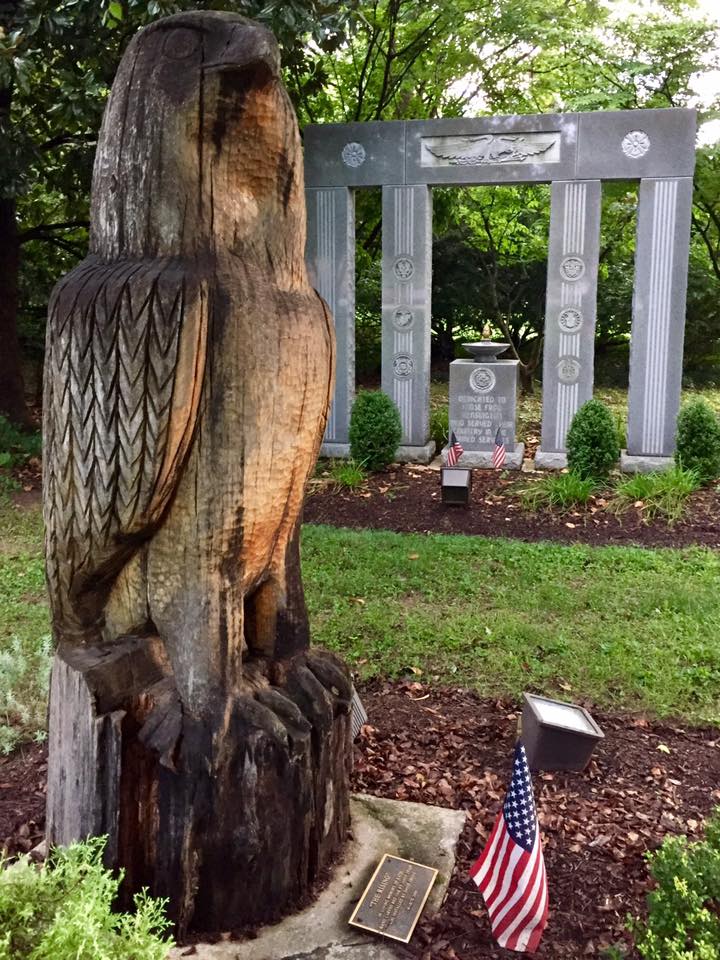 | "Chill out!" Dr Stephanie chides a driver for impatiently honking at a deer standing near Beach Drive. "Why is everyone in such a hurry?" Our excuse: we're dashing toward Ken-Gar to join Rebecca, Barry, and Gayatri for a Sunday morning ramble in the park. Dawn begins with humidity a sultry 97% and temps in the mid-70s, a relatively-blissful 10 degrees cooler than yesterday. Saturday evening thunderstorms left puddles that block Rock Creek Trail, forcing squishy detours. "F this!" comments somebody who prefers vocabulary cleaner than shoes. "A fox lives near here!" says the lady walking along Kent St as we watch a rabbit dash for cover. On the way to Stephanie's I count a total of 6 hares; she spies 3 more during our trek, including one right by her car. ("That's MY bunny!") Two big deer watch during a pause for pics at the totem-pole eagle in Kensington's Ernest Memorial Park. A fawn ambles into Connecticut avenue, stopping traffic long enough for me to jaywalk safely. "867-5209!" Rebecca sings, after Barry and I butcher a chorus version of "Like a Rolling Stone". We run "The Silencer" hills, take the bridge over Veirs Mill Road, and continue northward. Barry and Gayatri turn back after 4 miles; Stephanie and Rebecca continue another half mile or so upstream. "That one missed us!" In the woods a giant "widowmaker" branch crashes to the ground. Back at Ken-Gar we fist-bump salutes, wish one another well, and part ways. Stephanie and I amble back to her home, and then I take the cut-through past Strathmore Hall, trot along Rockville Pike, and proceed home via a more southerly section of RCT. A woman training for the "Last Man Standing" ultra in Maine has just finished doing 20 miles; I give her some Succeed! electrolyte capsules to help her recovery. The old phone battery dies at mile ~15, so this trackfile is edited to show the final 8 miles and total time correctly. |
(trackfile)
- Sunday, September 10, 2017 at 06:03:30 (EDT)
From the chapter titled "Generosity" of Wherever You Go, There You Are by Jon Kabat-Zinn: "At the deepest level, there is no giver, no gift, and no recipient . . . only the universe rearranging itself."
(cf. My Business (1999-05-30), No Glory (2000-01-11), Concerning Charity (2003-12-22), Mantra - Ditto (2015-08-30), Mantra - For Us (2015-11-28), Mantra - No Others (2016-06-27), Mantra - No Self (2016-10-25), Mantra - We Are One (2017-04-18), Mantra - Say Thanks, not Sorry (2017-06-21), We Are One (2017-07-22), ...)
- Saturday, September 09, 2017 at 04:49:29 (EDT)
~15.0 miles @ ~13.0 min/mi
"Total meltdown!" I tell Dr Fonda. Relative humidity this morning is in the 95%+ zone, and after a dozen miles dual whammies of overheating plus dehydration force me to cut short the trek and walk home. Stephanie's right heel tendon and my left hip adductor are twingey but "OK-ish" (her apt term). She runs solo back to her home.
"We were Stuck!" Mindful conversation today focuses on letting-go, on not-judging, on forgetting one's self. So difficult, so important. Comments by Charlotte Joko Beck (Joko on Joy) and Shunryu Suzuki (Not Always So) come to mind. Yes, and a surprise shoulder-punch demonstrates one of the "5 Love Languages", and almost makes somebody fall down!
"Rabbits #5 and #6!" Two cute bunnies pose together by the Bethesda Trolley Trail, then dash away as soon as I reach for camera to photograph them. Total joint coney count = 8, plus an earlier 4 spied in Kensington on the way to Stephanie's 'hood. Plus a quarter found on the street!
(trackfile)
- Friday, September 08, 2017 at 04:20:41 (EDT)
~8.0 miles @ ~13.0 min/mi
"Stuck in traffic — don't wait for me!" Kristin texts on a gloomy morning between storms. But she finds a good detour and meets the rump Dawn Patrol as we loop back after a mile. Cut-through pathways are slippery-slick with wet leaves; thankfully, nobody falls. Kerry reports on weekend celebrations including a birthday cake featuring a major typographical error in her son's name. A high-energy puppy wearing the Cone of Shame greets us near a new high-rise condo, where exercise equipment stands idle in the fancy glass-fronted gym.
"Robert the Bruce — wasn't he an early king of Scotland?" We meet a Langley neighbor, Robert, out walking his dog, Bruce. "But what good is a mnemonic that's harder to remember than the data itself?" We pause for iced coffee at mile 6, then sprint back before a deluge of Monday work begins.
(trackfile)
- Thursday, September 07, 2017 at 05:20:25 (EDT)
From Chapter XXVI of Howards End by E M Forster, on imperfection and happiness:
On the whole she sided with men as they are. Henry would save the Basts as he had saved Howards End, while Helen and her friends were discussing the ethics of salvation. His was a slap-dash method, but the world has been built slap-dash, and the beauty of mountain and river and sunset may be but the varnish with which the unskilled artificer hides his joins. Oniton, like herself, was imperfect. Its apple-trees were stunted, its castle ruinous. It, too, had suffered in the border warfare between the Anglo-Saxon and the Celt, between things as they are and as they ought to be. Once more the west was retreating, once again the orderly stars were dotting the eastern sky. There is certainly no rest for us on the earth. But there is happiness, and as Margaret descended the mound on her lover's arm, she felt that she was having her share.
- Wednesday, September 06, 2017 at 04:35:47 (EDT)
~10.3 miles @ ~14.5 min/mi
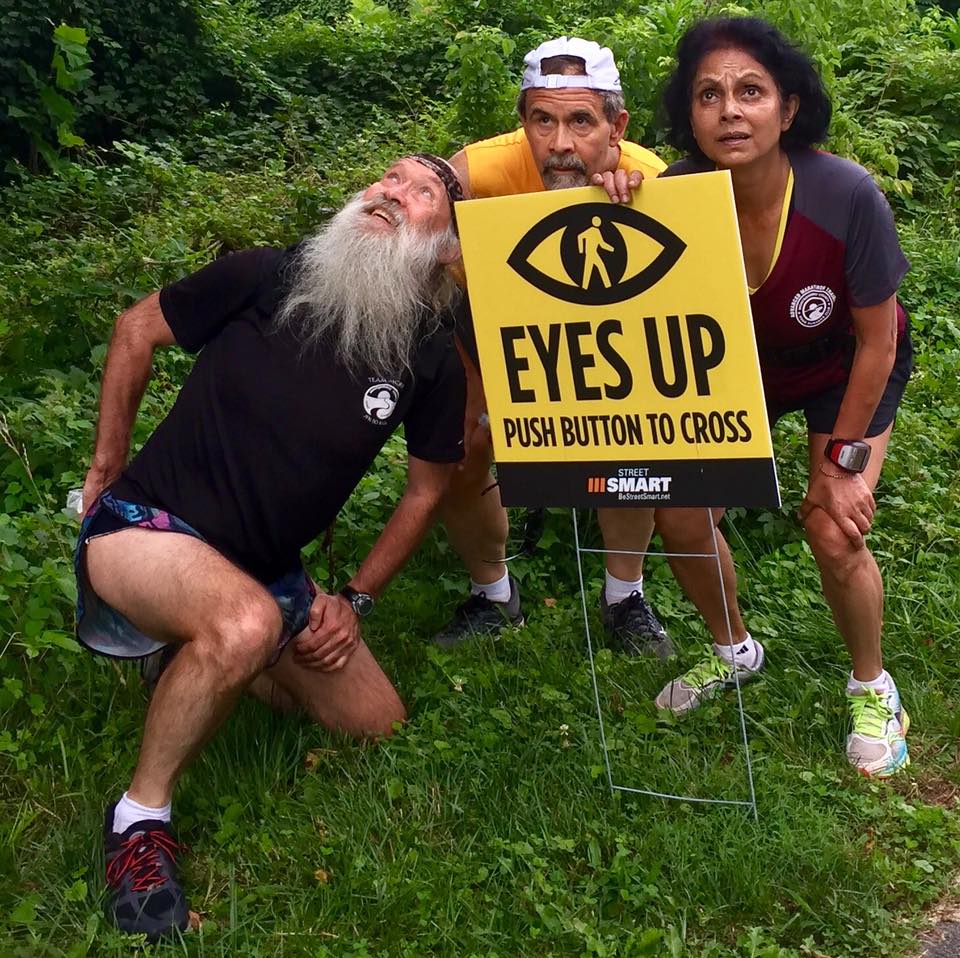 | "There were frogs in that pond, but they croaked!" Barry jokes as we pass wetlands to the sound of loud amphibian cheers. At 0659 he and Gayatri are just getting out of their cars when I arrive in Ken-Gar on foot, via the Capital View - Kent - Plyers Mill route. Kensington lawn rabbits and a front-yard mushroom highway offer irresistible photo opportunities on the way. My phone crashes, restarts, then dies for good as we pause to pose for more pics. Bunny Count = 2. "Her 'Talent' was to swing from her husband's beard!" Gayatri says, and thinks of me as she watches a recent "America's Got Talent" TV show. We do out-and-backs along Rock Creek, then head north and branch onto the Matthew Henson Trail. New signage admonishes "Eyes Up!" near a dangerous crosswalk. We watch the skies and compare notes on extraterrestrial invasion films. ("Tell the world. Tell this to everybody, wherever they are. Watch the skies everywhere. Keep looking. Keep watching the skies." - The Thing from Another World (1951)) Marathon training groups greet us as they dash downstream. At mile ~9 Rebecca joins us and pulls us along for the final stretch. It's a cool day! |
(trackfile)
- Tuesday, September 05, 2017 at 05:31:38 (EDT)
Meandering, weedy, without clear destination — The Path: What Chinese Philosophers Can Teach Us About the Good Life is a loosely written and generally unimpressive survey. Co-authors Michael Puett (Harvard professor of Chinese History) and Christine Gross-Loh (journalist, author of The Diaper-Free Baby, Harvard PhD in East Asian History) set up straw men and knock them down. Occasional graceful notes are almost lost in the noise of grandiose claims and vague, irrefutable platitudes. The book lacks an index. Its "before the Big Bang" faux-physics cosmology is silly-muddled. <sigh>
Worth pondering, however, is the end of Chapter 3 ("On Relationships: Confucius and As-If Rituals"):
We tend to believe that to change the world, we have to think big. Confucius wouldn't dispute this, but he would likely also say, Don't ignore the small. Don't forget the "pleases" and "thank yous." Change doesn't happen until people alter their behavior, and they don't alter their behavior until they start with the small.
Confucius taught that we can cultivate goodness only through rituals. Yet it is only once we conduct our lives with goodness that we gain a sense of when to employ rituals and how to alter them. This may sound circular, and it is. This very circularity is part of the profundity of his thought. There is no ethical or moral framework that transcends context and the complexity of human life. All we have is the messy world within which to work and better ourselves. These ordinary as-if rituals are the means by which we imagine new realities and over time construct new worlds. Our lives begin in the everyday and stay in the everyday. Only in the everyday can we begin to create truly great worlds.
That has power and might merit memorizing:
All we have
is the messy world
within which to work
and better ourselves. |
And perhaps there are Category Theory tricks implicit in the better sentiments sketched along The Path? Daoism = arrows, Zen = dots; zoom and transcend; invert and return. Or maybe that's just tea-leaf reading, pattern-spotting in the mess?
- Monday, September 04, 2017 at 06:06:42 (EDT)
~10.8 miles @ ~12.6 min/mi
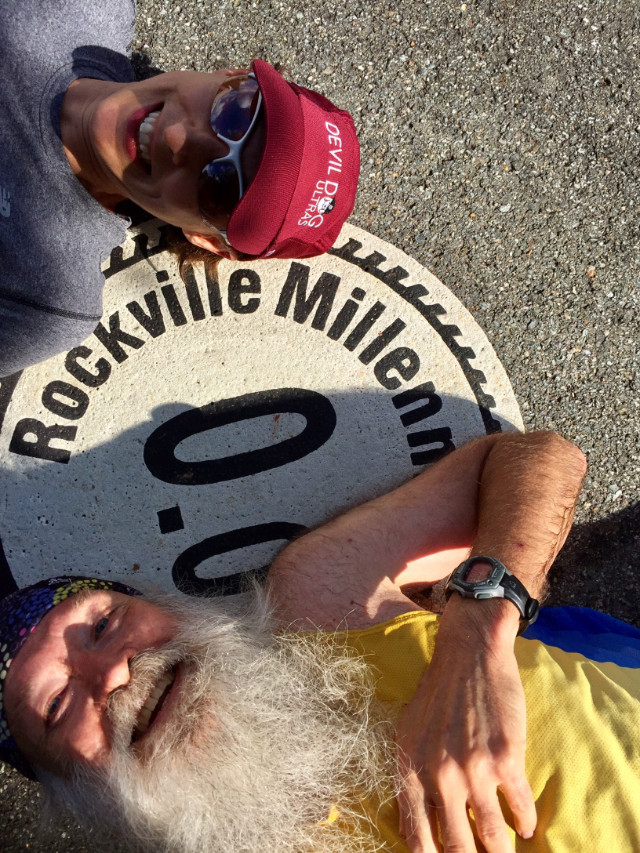 | "Intelligence plus compassion plus humor plus humility," Dr Fonda and I list characteristics of the nicest people we know. "And steadiness plus honesty plus joy!" It's a delightful breezy-cool morning to enjoy the Carl Henn Millennium Trail around Rockville. A bunny freezes at our approach, then darts into the bushes. We have the path to ourselves for the first few miles, after which increasing numbers of runners and cyclists appear. "The best thing about listening to opera on the radio is singing along — whether or not you know the words!" We greet other runners and offer them aid if they look weary. "Wait! Wait!" says the crosswalk voice as cars blast by. Lovely flower gardens bloom beside the asphalt. "Beautiful, uh, hair!" I observe, when we pass a young couple out for a walk. Stephanie, who knows where my eyes strayed, laughs kindly and agrees. Thomas Farm Community Center offers a chance to pose for selfies at "Mile 0.0", and to refill the water bottle halfway around the circuit. Shaded asphalt gives way to sunny sidewalk. Woodsy parkway leads past schools to apartment complexes, then an industrial/office zone, followed by quiet neighborhoods. Original planned pace is 13-14 min/mi but even including all breaks we're faster and finish strong. Tendons in feet are twingy-OK. |
(trackfile)
- Saturday, September 02, 2017 at 15:42:37 (EDT)
During the run 2017-07-29 - WOD with Friends we went by the ArtSpace Herndon where striking murals filled some of the windows and little objects sat on the sills:
- Friday, September 01, 2017 at 03:32:16 (EDT)
~6.7 miles @ ~14.5 min/mi
"For-Frigging-ever!" Kristin defines a new unit of time, equal to how long it takes her kids to get ready for anything. But patience with delay is sometimes rewarded by a Happy Family Moment that makes it all worthwhile. The Dawn Patrol runs first to Starbucks and snags iced coffee, then proceeds to cut through Bryn Mawr Park. In the neighborhood east of McLean High School a red fox dashes away. Sunrise tints the eastern sky in rosy hues near the horizon, grading up to azure and sapphire.
"Is that real?" The big doe stands statue-still on a front lawn. Cait spies two spotted fawns lurking behind their mom. Kerry recalls a similar deer posing by the entrance to Shenandoah National Park. We reminisce about small-world phenomena, socially-less-than-ept geniuses, and unforgettable moments in middle school Latin class. At the farmers market it's too early to buy bread or cookies, alas.
(trackfile)
- Thursday, August 31, 2017 at 04:45:58 (EDT)
E M Forster's 1908 novel A Room with a View feels tiny, petty, weak — especially when compared with his later Howards End and Passage to India. Class snobbery is caricatured; personal relationships are dissected; coincidental encounters are portentous; but imagery and poetry are thinner, less glistening, more sporadic than in Forster's best. The carriage of the plot rattles along and eventually reaches a destination.
Yes, there are brilliantly illuminated scenes along the way. At the beginning of Chapter 3 ("Music, Violets, and the Letter 'S'") for example:
It so happened that Lucy, who found daily life rather chaotic, entered a more solid world when she opened the piano. She was then no longer either deferential or patronizing; no longer either a rebel or a slave. The kingdom of music is not the kingdom of this world; it will accept those whom breeding and intellect and culture have alike rejected. The commonplace person begins to play, and shoots into the empyrean without effort, whilst we look up, marvelling how he has escaped us, and thinking how we could worship him and love him, would he but translate his visions into human words, and his experiences into human actions. Perhaps he cannot; certainly he does not, or does so very seldom. Lucy had done so never.
She was no dazzling exécutante; her runs were not at all like strings of pearls, and she struck no more right notes than was suitable for one of her age and situation. Nor was she the passionate young lady, who performs so tragically on a summer's evening with the window open. Passion was there, but it could not be easily labelled; it slipped between love and hatred and jealousy, and all the furniture of the pictorial style. And she was tragical only in the sense that she was great, for she loved to play on the side of Victory. Victory of what and over what—that is more than the words of daily life can tell us. But that some sonatas of Beethoven are written tragic no one can gainsay; yet they can triumph or despair as the player decides, and Lucy had decided that they should triumph.
A very wet afternoon at the Bertolini permitted her to do the thing she really liked, and after lunch she opened the little draped piano. A few people lingered round and praised her playing, but finding that she made no reply, dispersed to their rooms to write up their diaries or to sleep. She took no notice of Mr. Emerson looking for his son, nor of Miss Bartlett looking for Miss Lavish, nor of Miss Lavish looking for her cigarette-case. Like every true performer, she was intoxicated by the mere feel of the notes: they were fingers caressing her own; and by touch, not by sound alone, did she come to her desire.
Erotic indeed! If only ...
- Wednesday, August 30, 2017 at 04:35:41 (EDT)
~7.7 miles @ ~12.7 min/mi
"Weirdest pickup line? How about, 'I've got a bread machine in my dorm room — wanna come see it?'" Cait and Kristin reminisce about college days and what it's like to be an undergraduate engineer. As the Dawn Patrol trots through Tysons Corner a crimson sun peeks between clouds. Kerry reports on plans to celebrate imminent birthdays of her husband and son.
"We're kinda averse to deer ticks and poison ivy," we tell colleagues Chris Roberts and Jack Kurisky, who took the natural-surface Pimmit Run Trail this morning along the brushy stream. Both are fast VHTRC runners: Chris was an aid station volunteer at the Prince William Forest Park night run that I DNF'd at recently, and Jack just finished the ultra-hard Hardrock 100. Wow!
(trackfile)
- Tuesday, August 29, 2017 at 04:44:50 (EDT)
From Chapter XXV of Howards End by E M Forster, on the importance of friendships — and of choosing and cultivating one's friends carefully:
... He had not the knack of surrounding himself with nice people—indeed, for a man of ability and virtue his choice had been singularly unfortunate; he had no guiding principle beyond a certain preference for mediocrity; he was content to settle one of the greatest things in life haphazard, and so, while his investments went right, his friends generally went wrong. She would be told, "Oh, So-and-so's a good sort—a thundering good sort," and find, on meeting him, that he was a brute or a bore. If Henry had shown real affection, she would have understood, for affection explains everything. But he seemed without sentiment. The "thundering good sort" might at any moment become "a fellow for whom I never did have much use, and have less now," and be shaken off cheerily into oblivion. Margaret had done the same as a schoolgirl. Now she never forgot any one for whom she had once cared; she connected, though the connection might be bitter, and she hoped that some day Henry would do the same.
- Monday, August 28, 2017 at 04:29:24 (EDT)
~13.4 miles @ ~13.8 min/mi
"Surprise!" At mile 10 we're passing by the summer youth camp where Dr Kerry's son is working. Perfect timing: divert to greet him! It's an awesome cool and low-humidity morning. We trot without plans, enjoying day and comradeship. A fox starts to cross the road, then thinks better of it and retreats into a back yard. Kristin and Cait spy two big deer and four rabbits.
"A hidden gem - such a beautiful neighborhood!" We run along North Albemarle St, marveling at the dense woods, somber valleys, narrow winding road. An ancient stone chimney stands alone, last remnants of a long-gone home. Cars slow politely to keep us safe.
"My first 50 miler will be an easy one," somebody comments. "Hmmmm," is the reply, "there were no qualifiers like 'if I ever' in that sentence. Slip of the tongue?"
(trackfile)
- Sunday, August 27, 2017 at 05:48:08 (EDT)
~7.0 miles @ ~13.4 min/mi
"You can't expect to wield supreme executive power just 'cause some watery tart threw a sword at you!" A splash spreads ripples across the C&O Canal: the Lady of the Lake, trying to give Excalibur to Dr Fonda? Or a turtle fighting with a fish? Mists swirl on the surface as we trot upstream from Carderock, discussing politics and friendships, injuries and birthdays. Another Stephanie stops and asks us to keep an eye out for her lost credit card. Kayakers and paddleboarders portage their equipment. A kingfisher perches patiently on a stick.
(trackfile)
- Sunday, August 27, 2017 at 05:42:45 (EDT)
In his recent New York Times op-ed column "What Moderates Believe" David Brooks sketches a thoughtful vision of civil society, beginning with an image:
... politics is a voyage with a fractious fleet. Wisdom is finding the right formation of ships for each specific circumstance so the whole assembly can ride the waves forward for another day. ...
His eight-fold way:
- The truth is plural ...
- Politics is a limited activity ...
- Creativity is syncretistic ...
- In politics, the lows are lower than the highs are high ...
- Truth before justice ...
- Beware the danger of a single identity ...
- Partisanship is necessary but blinding ...
- Humility is the fundamental virtue ...
- Saturday, August 26, 2017 at 04:51:46 (EDT)
~7.5 miles @ ~15 min/mi
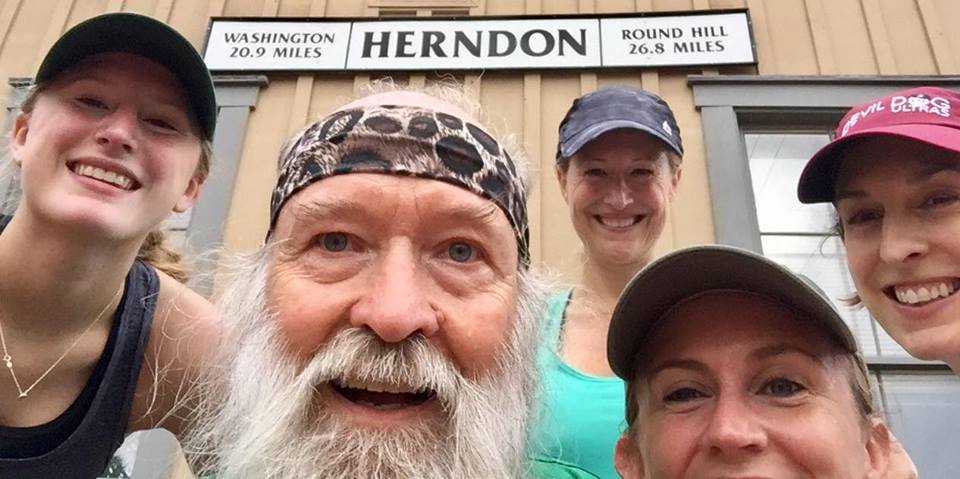 | "This afternoon I'll be in a wheelchair!" declares Kerry's daughter at mile 7. With a big day of shopping ahead she decides to run with Mom early Saturday morning, and does half a dozen miles more than ever before. (Go Green!) A big doe ambles across the W&OD Trail just in front of Amy and Stephanie. Two spotted fawns lurk nearby. Heavy rains pause for a few hours, and when we finish ice remains unmelted in the cups of cold coffee we sip before the start. The downtown Herndon train station provides a group selfie opportunity. |
| "They've outrun their coaches!" Friendly groups are out training for the Marine Corps Marathon. We walk the hills, pause for photos, take meditative breaks in pathside bushes, remember U2 concerts, and share trail talk about old, new, and planned tattoos. Lotus flowers blossom in the pond near American Dream Way. At the downtown Herndon animal hospital we take a break in front of the mural by Keith Naquin. | 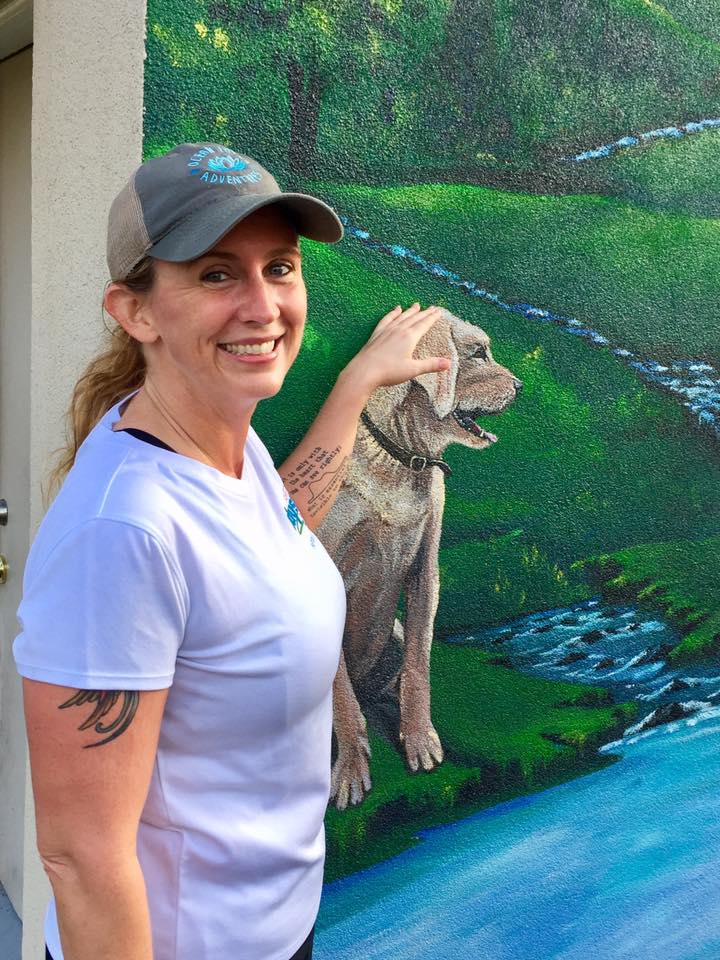 |
 | At the mural Stephanie and Amy pose for puppy pics. After the run they solve the world's problems at the Silver Diner over quinoa pancakes & veggie huevos rancheros. It's all good. (except for a GPS glitch which pauses the trackfile for ~20 minutes - actual distance ~7.5 miles) |
(trackfile)
- Friday, August 25, 2017 at 06:04:20 (EDT)
From Eugenia Cheng's Beyond Infinity, Chapter 13:
Mathematics ... is like an unending series of mountain ranges. Every time you conquer one, you have a moment of elation and then you realize that conquering this peak has just enabled you to see the higher peaks ahead ....
This is inevitable. In fact, it's part of the power of mathematics. It's because the concepts we study can always be built into bigger ones. Those, in turn, can be built into bigger ones, and so on forever. This is because of the abstract nature of it. If we are climbing mountains, we don't build more mountains out of the ones we've already climbed — we just see more that are there. In math, we keep building bigger and bigger ones.
It's not that we do it willfully; it's that the methods we develop for studying things in math are actually new pieces of math. To study those, we create new pieces of math that then need to be studied. This doesn't happen if you're studying birds: the methods you develop for studying birds aren't themselves birds.
This is how category theory arose, as a new piece of math to study math. In a way, category theory is an ultimate abstraction. To study the world abstractly you use science; to study science abstractly you use math; to study math abstractly you use category theory. Each step is a further level of abstraction. But to study category theory abstractly you use category theory.
- Thursday, August 24, 2017 at 05:47:14 (EDT)
~7.2 miles @ ~12.0 min/mi
"To the Sun!" Kristin sends the Dawn Patrol east on a muggy morning. A dime gleams on the sidewalk at the corner of Chain Bridge and Old Dominion. "Is there anything I could buy with this at 7-11 nowadays?" We trot past the Eagle House and the Lavender Bungalow. One small bunny hops into the bushes.
"In the dark you could follow that black dog by the white tip of his tail!" Someone obsessive requests we sprint the last quarter mile to keep our overall pace sub-12. At run's end Cait and Kristin diagnose the pain in my side. "Knife stab?" - "Kidney stone?" - "Intestinal cramp?" - "Broken rib?" - "Purely psychosomatic?"
Let the pity party begin ...
(trackfile)
- Wednesday, August 23, 2017 at 04:40:42 (EDT)
Like Howards End, E M Forster's 1924 novel A Passage to India is artfully written, thoughtful, gentle, harsh, and far ahead of its time in lovingkindness toward humanity in its glorious and tragic diversity. Imagery echoes: stars and skies, beasts and men, glorious beauty in all of its infinite forms. Forster puts human relationships under the microscope and analyzes them mercilessly. His characters are both weak and strong, confused and brilliant, selfish and noble. Passage to India is comic, dark, fiery, brisk. Like life.
A tiny snapshot, from Section I (Mosque), Chapter III:
Mrs. Moore, whom the club had stupefied, woke up outside. She watched the moon, whose radiance stained with primrose the purple of the surrounding sky. In England the moon had seemed dead and alien; here she was caught in the shawl of night together with earth and all the other stars. A sudden sense of unity, of kinship with the heavenly bodies, passed into the old woman and out, like water through a tank, leaving a strange freshness behind. ...
And a little later, in the same section's Chapter V ("kites" are a species of bird):
... Some kites hovered overhead, impartial, over the kites passed the mass of a vulture, and with an impartiality exceeding all, the sky, not deeply coloured but translucent, poured light from its whole circumference. It seemed unlikely that the series stopped here. Beyond the sky must not there be something that overarches all the skies, more impartial even than they? Beyond which again . . . ...
More brief bits to follow ...
- Tuesday, August 22, 2017 at 05:49:09 (EDT)
~6.1 miles @ ~13.3 min/mi
"It's like we're on another planet!" Kristin describes the lovely weather this morning, temperature and humidity both far more comfortable than for the past week. A medium-large red fox crosses the street and stops to stare at us half a mile into the run. On Lupine Lane a peloton of spandex-clad cyclists swoops past. Kerry shares the secret of how to drive a rental car overseas, on the left side of the road down narrow country lanes in the presence of kine and other creatures. (Answer: buy extra insurance!) Caitlin reports meeting "Fletcher", a baby name that apparently is trending this year. A bronze front-yard sculpture depicts a young brother and sister reading together.
(trackfile)
- Monday, August 21, 2017 at 04:16:59 (EDT)
~5.9 miles @ ~13.2 min/mi
"Bunny Eyes!" Kristin spots 5 rabbits today during a soggy-warm Dawn Patrol meander. Overnight storms leave big puddles behind; sunrise seems to come late, perhaps due to thick cloud cover. The track at George Marshall HS is securely fenced off — no speedwork for us today! Fantastic Beasts and Where to Find Them is Caitlin's latest film recommendation. After a delay at the Route 7 crosswalk we dash most of the way back and pull the average pace down by more than a minute/mile.
(trackfile)
- Monday, August 21, 2017 at 04:14:17 (EDT)
From Eugenia Cheng's Beyond Infinity, Chapter 4:
I truly believe that trying to explain everything isn't the point. Rather, the point is to explain as much as we can, and, importantly, to be clear where the boundary is between what we can and can't explain. In my mind's eye, the sphere of things we can logically explain is at the center of the universe of ideas, and the aim of mathematics is to move as much as possible into that sphere. So the sphere is always expanding, and as it does so, its surface keeps growing. The surface is where the explicable and the inexplicable meet. ...
- Sunday, August 20, 2017 at 05:46:56 (EDT)
~8.7 miles @ ~13.8 min/mi
 | "Lots of 'F' words!" Lucas notes, reading the FDR Memorial's wall of Four Freedoms. He leads a motley crew, including Janet, Viviana, Sako, Sean, and Tom around the Theodore Roosevelt Island maze o' twisty pathways. We lope along the Swamp Trail boardwalk, pause at the plaza to admire a manly statue of Teddy, then take his eponymous bridge into DC. Temperature and relative humidity are both in the low 80s, Fahrenheit and percent respectively. "You don't HAVE to run up the stairs to Abraham Lincoln like 'Rocky' - I was joking!" But it's too late, so climb we must. Then Martin Luther King Jr and George Mason watch us pass by on the way to visit Thomas Jefferson. While the rest run onward Sakurako and I take the 14th Street Bridge to get back on time. At the Memorial Bridge suddenly Janet and Sean appear, returning via another route. Cyclists swoop past us on the Mount Vernon Trail. The parking lot that was empty when we arrived at 0630 now overflows with monster trucks. |
(trackfile)
- Saturday, August 19, 2017 at 05:31:37 (EDT)
~6.2 miles @ ~12.9 min/mi
"Whoa!" Hazards of texting-while-running: I almost bump into a closed gate at the parking lot entrance. Caitlin and I are circling the office complex while awaiting Kristin, who met heavy traffic on her way in. A thin-sliver crescent moon fades into the background as sunrise paints clouds in persimmon-peach hues. Soon Dr K joins us and we head east.
"Where's the frog prince?" In the Evans Farm complex we spot the sculpture of the crowned amphibian, a marker on the way to a new cut-through path. Enterprise Avenue brings to mind Star Trek. Meanders take us past Bryn Mawr park from a new direction. At the high school track somebody manages a 1:35 lap. Rabbit count = 3.
(trackfile)
- Friday, August 18, 2017 at 04:44:48 (EDT)
From Chapter 26 ("Not Yet") of Subtle Sound: The Zen Teachings of Maurine Stuart:
Buddhism is not a set of doctrines. It has no dogma. It just teaches us about becoming buddhas. It is a way of spiritual self-development, but above all it is a way of action, first, last, and always. We must do something with this. We don't just sit around and talk about it, or sit on our cushions and gulp it all down for ourselves. We give it away; we radiate it. There are no shortcuts; there are no bypasses. There is no instant magical potion. We must go it on our own, on our two feet alone; yet we are always aware of our interrelatedness. Through each thought, each action, we can help or hinder one another. We take one step at a time, just as in kinhin. Just one step at a time. What we do will not be perfect, we know that. But, as R. H. Blyth says, "Perfection means not perfect actions in a perfect world, but appropriate actions in an imperfect one."
If we approach Zen practice with fixed ideas about what it will do for us, we just get in our own way. "Will this be good for me? Will it get me what I want? Is this what I'm here for? What if I have a wonderful enlightenment experience—will I look silly? What if I fail to have kensho and never understand anything at all? How long will it take for me to come to some realization?" All these ideas are impediments. Why worry about satori? There are people of great Zen spirit and action who have never heard the word satori in their entire lives. There are people who have had satori who behave abysmally. Forget about enlightenment. If we have it, wonderful; we let it go, without a single thought about it. If we don't have it, fine; the accumulated practice of deep samadhi—intense, concentrated sitting, with no pushing, no forcing—penetrates our entire being. This is the most important thing. The path of Zen is not about experiencing some sudden burst of something that is gone in a flash. Having some insight, some kensho, is indeed wonderful, but then we let it go, and we don't talk about it, we don't discuss the experiences we have had with others. Such experiences are just the beginning, not the end of our practice. Even reading about other people's experiences can be a problem, because one can become attached to that description and thing, "Oh, maybe it will happen to me that way." It can only happen as our experience, through our own zazen, in our own life. Then whatever it is we have experienced we give away to others, without saying a word about it. "See, I'm giving you my Zen. Isn't it wonderful?" No!
- Thursday, August 17, 2017 at 05:16:39 (EDT)
~5.7 miles @ ~13.1 min/mi
"That's the sound of water hitting pants!" At mile 5 the Dawn Patrol unanimously pauses to stand in front of curbside lawn sprinklers. Summer morn is warm and hyper-humid. Bunny count = 5, the majority spied by Kristin. Cait explains that raccoons don't wash their food, they wet their paws to make them more sensitive.
(trackfile)
- Wednesday, August 16, 2017 at 05:47:53 (EDT)
Graffiti seen in the tunnel under Duval Road near Balcones District Park during the 2017-07-17 - Austin Texas Trekking run:
- Tuesday, August 15, 2017 at 07:00:23 (EDT)
~11.0 miles @ ~13.5 min/mi
Even at sunrise running is stressful on a warm, humid morning in Austin Texas. Rabbit count = 1, a shy bunny in Great Hills Park; deer count = 3, audacious beasts standing in the street during the final mile.
Boy Scouts have built bat houses; near a playground a faux chimney stands for chimney swifts to nest in. The lake path at Quarries Park leads back onto neighborhood streets. Bright new graffiti decorates the tunnel under Duval Road near Balcones District Park. Follow Big Walnut Creek upstream, then take the railroad tracks to Yett Creek Neighborhood Park and back to the start. Whew!
(trackfile)
- Monday, August 14, 2017 at 04:18:33 (EDT)
From Chapter XXIV of Howards End by E M Forster, lovely description of the tree next to the eponymous home:
... it was English, and the wych-elm that she saw from the window was an English tree. No report had prepared her for its peculiar glory. It was neither warrior, nor lover, nor god; in none of these roles do the English excel. It was a comrade bending over the house, strength and adventure in its roots, but in its utmost fingers tenderness, and the girth, that a dozen men could not have spanned, became in the end evanescent, till pale bud clusters seemed to float in the air. It was a comrade. House and tree transcended any similes of sex. Margaret thought of them now, and was to think of them through many a windy night and London day, but to compare either to man, to woman, always dwarfed the vision. Yet they kept within limits of the human. Their message was not of eternity, but of hope on this side of the grave. As she stood in the one, gazing at the other, truer relationship had gleamed.
- Sunday, August 13, 2017 at 04:42:35 (EDT)
~13.8 miles @ ~12.8 min/mi
"Pain is best experienced solo," says Phil Hill, explaining why he isn't doing a group training program this year. We introduce ourselves on the Capital Crescent Trail, where's he's running ~20 miles alone. "If you feel like that, I'll branch off here!" I joke, and take the side path toward Rock Creek and hilly Leland Street. We laugh as we part ways. A snakeskin-patterned headband lies on the sidewalk. A rising sun paints the clouds with pastel orange hues.
"Slouching toward Bethesda", rabbit Count = 1. A big deer strides calmly across the road in search of a new garden to graze in. At our downtown rendezvous Barry announces, "It's Slurpee Week!" Rebecca recommends an out-and-back on the shady southward side of the CCT, and so we proceed.
"What are the events in a Decathlon?" We ask passing runners, but nobody knows, so eventually the Interwebs tell us. "When the King of Sweden told Jim Thorpe, 'You, sir, are the greatest athlete in the world!' he supposedly replied, 'Thanks, King!' ... or maybe that's just a story."
We pause to survey a valley full of invasive ivy, overgrowing the trees like a mass of green octopi. "And yet, think of all the people who can never get out to see this. We're truly blessed!" Speedy cyclists whiz past, some giving warning, most not. It's a soggy-warm summer morning.
Howards End — Room with a View — Passage to India — we compare notes on E M Forster novels and the films based on them. Someone reminisces about a dog nip on the derriere, but refrains from exhibiting the evidence. "You could have complained to the County - there's a $500 fine for 'unwanted contact' like that!" We send good vibes and best wishes to comrades doing the Vermont 100 and the Catoctin 50k today.
(trackfile)
- Saturday, August 12, 2017 at 04:59:11 (EDT)
We've Fallen
from Greater
Heights! |
... as a dear friend commented in the midst of crisis: worse things have happened, worse things may happen, and we shall survive — and emerge stronger!
(cf. Parachute Color (2011-12-06), Mindfulness for Beginners (2013-07-18), Up Again (2016-12-04), ...)
- Friday, August 11, 2017 at 05:18:34 (EDT)
~5.8 miles @ ~14.8 min/mi
"So hard to see things from another person's viewpoint!" Mindful conversation today begins with thoughts on empathy and metacognitive modeling of mental states. A Dawn Patrol Duo heads toward a rising sun, climbing hills and taking cut-throughs. Unusual mansion security features provoke Bayesian analysis of possibilities. Kristin carries the other Dr K's newspaper up to her front doorstep as we loop through West Langley and pause to take pictures.
"We're discovering new ways to escape if the police are in hot pursuit!" A previously-unknown brick walkway leads through a gap in the wall from Enterprise Avenue to Farm Meadow Court. A grassy path starts strong but then fades between Evans Drive and McLean Commons Lane. Bunny count = 4.
(trackfile)
- Thursday, August 10, 2017 at 04:46:33 (EDT)
From Chapter 23 ("Listening to the Mind") of Subtle Sound: The Zen Teachings of Maurine Stuart:
One of our Sangha members came to me and said she was going away for a few months. "What shall I do? How shall I support my practice?" she asked me. "I am going to Europe, and will be living in hotel rooms, and I don't know how I will carry on" I said, "Sit down and take a deep breath, and you will be right here. We are together wherever we are, when we just sit down and take a deep breath."
We are all supporting each other wherever we are in the world, without saying, "Let me do this for you, you poor thing, how will you get along without us"—no, no. Just by being present. And as I've said many times, your zazen is your best teacher. Zazen washes away all conceptual thought, and makes the mind clear and fresh. You all have your own zazen mind, so listen to it. Your zazen mind teaches you about just how far you are going, just how much you trust, just how willing you are to believe in this mind, just how clearly you are coming to understand with your bones, your skin, your marrow, what this is about.
Through your zazen, you are giving up your discriminating attitudes and becoming absolutely clear and still. Sometimes you experience great pain, yet you remain sitting, sitting, sitting, not giving up, awake to everything. Sometimes it's noisy outside: chainsaws, children playing, people laughing and talking. It's all O.K., because you're awake to everything, to every single thing. If somebody makes a noise in the zendo, it's O.K. If somebody cries, it's fine. Cars go by and beep: no problem. Planes fly overhead: fine. Cats meow, dogs bark: good. Nothing is a disturbance when your zazen condition has become firm and clear. All judgmental attitudes about whether or not those noises are disturbing simply fall away.
It's one thing to sit in ideal conditions in the zendo, but we need to be ready to sit anywhere, on the streetcar, on the bus, anywhere! The world goes on, the sounds go on, the raindrops fall, the wind blows, and we are learning all this acceptance of it through our bodies, which sit still no matter what. If you want to memorize things in books about how to practice, fine, but it's not the same, is it. You don't read the menu to taste the food.
- Wednesday, August 09, 2017 at 05:22:44 (EDT)
~6.2 miles @ ~12.4 min/mi
"Kristin is taking the low ones for the Team, and I'm handling the higher ones!" says Cait, brushing spider webs off her face, as the Dawn Patrol runs down stairs and across a narrow bridge over the creek. It's a humid summer morning, already warm. Rabbit Count = 3, one seen by each of us. We discover a new cut-through, between Arch Drive and tiny Pimmit Road Park.
"Can I get that for my birthday?" Kristin and Cait have been teaching younger family members to make Toy Department wish-lists for the future — good training in deferred pleasure. Lawn sprinklers pop up as we pass. Stiff-legged dogs take their owners out for early walks.
(trackfile)
- Tuesday, August 08, 2017 at 04:50:28 (EDT)
From Eugenia Cheng's Beyond Infinity, Chapter 10:
One of the strange features of mathematics is that it is there whether or not we see or understand it, just like when we're on a train the scenery is there whether or not we look out of the window or know what it is that is going past. Understanding the mathematics that is there can enable people to build better systems and solve more complicated problems. But it can also shed light on how we interact with the world around us, and on how our minds work. Illumination is a more subtle and less dramatic result than solving a specific problem or building a specific technology, but to me it is very fundamental and far-reaching in its quiet importance.
- Monday, August 07, 2017 at 04:24:14 (EDT)
~6.1 miles @ ~13.7 min/mi
21 Bun Salute! — the Dawn Patrol this morning spies a score plus one of rabbits as we meander through West McLean and Lewinsville Heights, to tie last year's record coney count (cf. 2016-07-01 - Rabbit Run).
"If you can spell it, I'll tell you what it means and when you can use it!" Kristin explains her house policy toward kids' questions about naughty words. Cait recalls dodging a bullet and NOT being responsible for enhancing her young niece's vocabulary. Kerry reports that she survived a weekend of family luncheons and dinners, thanks in part to running 13 miles on Saturday.
(trackfile)
- Sunday, August 06, 2017 at 05:32:49 (EDT)
~12.0 miles @ ~12.9 min/mi
Bunny count in the 'hood = 10, in front yards along hilly Leland Street on the way to Bethesda. Sako & Barry each spy another during our final mile. Rebecca sends me on a sprint to catch Ken at mile 9 (split 9:11, whew!). Gayatri ran long yesterday and enjoys this morning with us. We discuss the best local restaurants to get samosas and other Indian food.
(trackfile)
- Sunday, August 06, 2017 at 05:30:13 (EDT)
From Chapter XIV of Howards End by E M Forster, an extraordinary description of a long walk through the night — an amazing, adventuresome walk, that transcends literature and interpretation and just is — a reminder that "words ... are no more than a finger pointing at the moon: Always go for the moon":
Said Helen, "No doubt it's another beautiful book, but I'd rather hear about your road."
"Oh, I walked."
"How far?"
"I don't know, nor for how long. It got too dark to see my watch."
"Were you walking alone, may I ask?"
"Yes," he said, straightening himself; "but we'd been talking it over at the office. There's been a lot of talk at the office lately about these things. The fellows there said one steers by the Pole Star, and I looked it up in the celestial atlas, but once out of doors everything gets so mixed."
"Don't talk to me about the Pole Star," interrupted Helen, who was becoming interested. "I know its little ways. It goes round and round, and you go round after it."
"Well, I lost it entirely. First of all the street lamps, then the trees, and towards morning it got cloudy."
Tibby, who preferred his comedy undiluted, slipped from the room. He knew that this fellow would never attain to poetry, and did not want to hear him trying.
Margaret and Helen remained. Their brother influenced them more than they knew; in his absence they were stirred to enthusiasm more easily.
"Where did you start from?" cried Margaret. "Do tell us more."
"I took the Underground to Wimbledon. As I came out of the office I said to myself, 'I must have a walk once in a way. If I don't take this walk now, I shall never take it.' I had a bit of dinner at Wimbledon, and then--"
"But not good country there, is it?"
"It was gas-lamps for hours. Still, I had all the night, and being out was the great thing. I did get into woods, too, presently."
"Yes, go on," said Helen.
"You've no idea how difficult uneven ground is when it's dark."
"Did you actually go off the roads?"
"Oh yes. I always meant to go off the roads, but the worst of it is that it's more difficult to find one's way.
"Mr. Bast, you're a born adventurer," laughed Margaret. "No professional athlete would have attempted what you've done. It's a wonder your walk didn't end in a broken neck. Whatever did your wife say?"
"Professional athletes never move without lanterns and compasses," said Helen. "Besides, they can't walk. It tires them. Go on."
"I felt like R. L. S. You probably remember how in Virginibus."
"Yes, but the wood. This 'ere wood. How did you get out of it?"
"I managed one wood, and found a road the other side which went a good bit uphill. I rather fancy it was those North Downs, for the road went off into grass, and I got into another wood. That was awful, with gorse bushes. I did wish I'd never come, but suddenly it got light—just while I seemed going under one tree. Then I found a road down to a station, and took the first train I could back to London."
"But was the dawn wonderful?" asked Helen.
With unforgettable sincerity he replied, "No." The word flew again like a pebble from the sling. Down toppled all that had seemed ignoble or literary in his talk, down toppled tiresome R. L. S. and the "love of the earth" and his silk top-hat. In the presence of these women Leonard had arrived, and he spoke with a flow, an exultation, that he had seldom known.
"The dawn was only grey, it was nothing to mention—"
"Just a grey evening turned upside down. I know."
"--and I was too tired to lift up my head to look at it, and so cold too. I'm glad I did it, and yet at the time it bored me more than I can say. And besides—you can believe me or not as you choose—I was very hungry. That dinner at Wimbledon—I meant it to last me all night like other dinners. I never thought that walking would make such a difference. Why, when you're walking you want, as it were, a breakfast and luncheon and tea during the night as well, and I'd nothing but a packet of Woodbines. Lord, I did feel bad! Looking back, it wasn't what you may call enjoyment. It was more a case of sticking to it. I did stick. I—I was determined. Oh, hang it all! what's the good—I mean, the good of living in a room for ever? There one goes on day after day, same old game, same up and down to town, until you forget there is any other game. You ought to see once in a way what's going on outside, if it's only nothing particular after all."
"I should just think you ought," said Helen, sitting—on the edge of the table.
The sound of a lady's voice recalled him from sincerity, and he said: "Curious it should all come about from reading something of Richard Jefferies."
"Excuse me, Mr. Bast, but you're wrong there. It didn't. It came from something far greater."
But she could not stop him. Borrow was imminent after Jefferies—Borrow, Thoreau, and sorrow. R. L. S. brought up the rear, and the outburst ended in a swamp of books. No disrespect to these great names. The fault is ours, not theirs. They mean us to use them for sign-posts, and are not to blame if, in our weakness, we mistake the sign-post for the destination. And Leonard had reached the destination. He had visited the county of Surrey when darkness covered its amenities, and its cosy villas had re-entered ancient night. Every twelve hours this miracle happens, but he had troubled to go and see for himself. Within his cramped little mind dwelt something that was greater than Jefferies' books—the spirit that led Jefferies to write them; and his dawn, though revealing nothing but monotones, was part of the eternal sunrise that shows George Borrow Stonehenge.
- Saturday, August 05, 2017 at 06:40:59 (EDT)
~20.6 miles @ ~13.4 min/mi
"Your parking lights are on!" The lady who answers a knock on her front door at 6:30am is thankful for the tip. Six rabbits dance along Kent Street in Kensington. Spiral around Warner Circle a couple of times to add a mystic symbol to the trackfile. Pause on the way to Rock Creek for a photo of a "Ewell Avenue" sign — Mary Ewell's taunt is responsible for today's mileage. The morning is warm and humid, temps rising into the 80s.
"Just arrived," texts Kerry, 30 seconds before I crest the hill to join her and Cait at Ken-Gar. Lure them into a hill climb until Rebecca appears and introduces us to her neighbor Paul, who was standing patiently by the trail, unrecognized. Trot upstream and back, pick up Barry, then repeat. Escort Caitlin (who has a deadline) back, ditto Barry several miles later, then add bonus distance to get the rest into the 12+ zone.
"Pizza! Iced coffee! Argentinian barbecue! Coke Slurpee!" Conversation turns to comestibles as blood sugar drops. Packs of training-group runners greet us as they sprint along RCT. "Howdy!" to Adeline, Mike, Michele, et al.!
(trackfile)
- Friday, August 04, 2017 at 04:10:04 (EDT)
From Chapter 22 ("Time Unfolds") of Subtle Sound: The Zen Teachings of Maurine Stuart:
Rain is falling; snowflakes are falling; the sun is shining. Everything is happening right now, at this moment. To talk about it is easy, but to really experience it—this is why we sit, sit, sit. We are told, "You have Buddha-nature from the very beginning, so what is there to do?" But unless we know this from the depths of our hearts, through our strong, disciplined zazen, we cannot express it in our lives. Each one of us must have our own experience. No one else's experience can be superimposed on ours. We are led astray by our egocentric thinking, our dwelling on "me." Of course, our ordinary consciousness has to be involved with what we need to do, what we should wear, where we are going, what food we should eat, where we should live, and so on. But here, during these days of just sitting, we drop all of that. Here, we have everything we need right at this moment. And when we go back to our everyday lives, perhaps we will see more clearly the things we can let go of there, too. Perhaps we don't need quite so much, quite so many things. Perhaps we can be less grabby. Having changed our attitude a little bit after sitting, sitting, sitting, we are able to see more clearly what our life is about.
There is no final realization. In this no-knowing, wondering-on, openhearted condition of mind, we face directly whatever comes—good, bad, ugly, beautiful. We don't push anything under the rug, we don't buffer it with something; we experience it fully. Just listening . . . when somebody strikes the gong, becoming one with that sound, not reflecting, "Oh, that's the sound of the gong," but just being that sound. No separation; nothing but gong, nothing but this very moment.
- Thursday, August 03, 2017 at 05:02:05 (EDT)
~5.2 miles @ ~13.8 min/mi
"Coyote Taco was just across the street!" The Dawn Patrol discovers a new cut-through, from Pine Hill Rd to Dolley Madison Blvd, a pedestrian pathway that we've passed by hundreds of times on the other side without noticing. A lovely front-yard garden beckons, graced with pink flamingo statues and flowing water. Echinacea and hydrangeas bloom in profusion. It's already a season of mists and mellow fruitfulness. Gentle rain patters down.
"Dynamite it?" - "Make it into a flower planter?" - "Carve a statue of a mermaid?" - "Maybe a basketball player?" Kerry seeks ideas for what to do with the remnants of a soon-to-be-removed dead tree in front of her house. Kristin comments on her talkative daughter, whose brother calls her "Motor-mouth!". Cait tiptoes on slippery stones, then jumps off to just run on the mud. An upcoming visit to Dublin for a U2 concert brings to mind the Broome Bridge there, where mathematician Hamilton invented a new number system, the Quaternions. (Maybe that could be a band name?)
(trackfile)
- Wednesday, August 02, 2017 at 04:20:15 (EDT)
Rocket Science is
not
"Rocket Science" |
... the complex, when properly understood, is actually simple ... and vice versa!
- Tuesday, August 01, 2017 at 05:30:09 (EDT)
~5.9 miles @ ~13.8 min/mi
"Whoa!" A misoriented sprinkler suddenly spews a stream across the sidewalk and wets our shins as Dr Kristin and I trot along Idlywood Rd. Oppressive humidity turns into a few drops of light rain. Bunny count in the 'hood is 2, both spied on the path in Pimmit View Park. Looking down from an overpass we speculate about the function of extra rails visible on the Metro tracks between the main rails (guard rails to prevent or limit a derailment?).
(trackfile)
- Monday, July 31, 2017 at 04:13:32 (EDT)
From Eugenia Cheng's Beyond Infinity, Chapter 4:
Mathematics can sometimes seem like a process of never getting anywhere, because every time you work out something new, it just reveals all the other things you don't know. And it's hard to keep track of where we've come from, because once we understand something, it can be hard to remember how difficult it used to be. I often feel like I'm making no progress in math because everything I already know seems easy and everything I haven't done yet is difficult (otherwise I'd already have done it).
- Sunday, July 30, 2017 at 05:18:00 (EDT)
~8.4 miles @ ~13.4 min/mi
"No puking, Leftenant Smythe!" Barry has just finished running four repeats up the median of Belvedere Blvd, a relentless climb that brings to mind Maryland Heights treks-of-legend by Dr Stephanie. Well, admittedly this is 60' instead of 1200' elevation gain, a 1/20th scale model — close enough, eh?!
We warm up by meandering around the 'hood, reminiscing about songs by Eric Burdon and the Animals. A fleet chipmunk scampers across Woodman Av. Rabbit count = 4, plus one more that Barry spies in his front yard flower bed after the run.
(trackfile)
- Saturday, July 29, 2017 at 04:48:26 (EDT)
From Chapter VI of Howards End by E M Forster, a beautiful image of "progress":
Here he stopped again, and glanced suspiciously to right and left, like a rabbit that is going to bolt into its hole. A block of flats, constructed with extreme cheapness, towered on either hand. Farther down the road two more blocks were being built, and beyond these an old house was being demolished to accommodate another pair. It was the kind of scene that may be observed all over London, whatever the locality—bricks and mortar rising and falling with the restlessness of the water in a fountain as the city receives more and more men upon her soil. Camelia Road would soon stand out like a fortress, and command, for a little, an extensive view. Only for a little. Plans were out for the erection of flats in Magnolia Road also. And again a few years, and all the flats in either road might be pulled down, and new buildings, of a vastness at present unimaginable, might arise where they had fallen.
- Friday, July 28, 2017 at 04:13:56 (EDT)
~20.5 miles @ ~14.5 min/mi
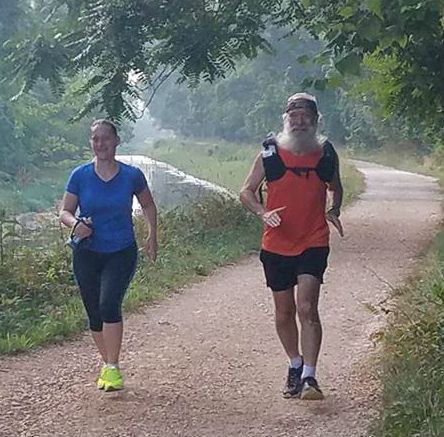 | "Plan? Why start now?" At mile 9 Cait responds to my apology for not designing our route in advance. At 0530 on a humid pre-holiday Monday Lucas joins the Dawn Patrol at the Teddy Roosevelt Island parking lot. Soon Janet arrives, after (like me) taking a series of wrong turns and enjoying an unanticipated "area familiarization" tour. While awaiting her we ramble a mile out-and-back. The island itself is closed so the Park Service can remove trees infested with emerald ash borer beetles. "Could we climb the fence? Or swim across? Or leap down from the bridge, ninja-style?" We decide against. |
| "Let's start with the Potomac Heritage 50k course — backwards!" Cross Key Bridge, hook down to the C&O Canal towpath via Francis Scott Key Memorial mini-park, and head upstream to Fletchers Boathouse. Two great blue herons peer at us as we trot past. Kerry spots three turtles swimming just below the surface of the water. Kristin gently suggests that it might be suboptimal to crawl through the pipe under Macarthur Ave and pick up deer ticks going through the woods along the stream. So we head back down the Potomac, pausing for photos at the Einstein statue, and return to TR Island via the 14th St Bridge and the Mount Vernon Trail. Kerry plans to see fireworks on the 4th of July at the National Mall, for the first time in 25+ years. Back at our start Janet, with meetings to attend, punches out. Kristin wisely does likewise, after checking her feet and discovering incipient blisters. Lucas, Cait, and Kerry take the Custis Trail out-and-back to add half a dozen final miles.We pause at Starbucks for iced coffee and tea. |  |
(trackfile)
- Thursday, July 27, 2017 at 04:23:57 (EDT)
Neil Gaiman paints nightmares, brilliantly. His short novel The Ocean at the End of the Lane (2013) brings beautiful language and terrifying situations, but like a dream lacks coherence. One thing happens after another, the plot advances, creatures and characters glide out of the mist, new rules appear with arbitrary regularity, and ultimately nothing much matters. As in a dream, there are powerful echoes of myths and fables from the past, poetic voices, memories and mirrors. All nicely done, scary but ... discouragingly empty.
- Wednesday, July 26, 2017 at 04:48:21 (EDT)
~6.9 miles @ ~10.2 min/mi
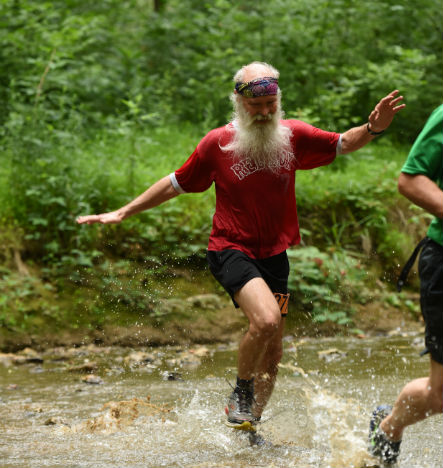 | "Half a mile to go, Sir!" Not much else to offer a runner who's retching into the bushes beside the trail. Hills, heat, and humidity slow everyone's pace in today's cross-country race, the MCRRC Little Bennett 10k (-ish) held in a park near Clarksburg Maryland. Comrade Barry kindly drives Ken and me there in the codgermobile, fueled outbound by much geezerly banter and during the return trip by a pause at Dunkin Donuts/Baskin Robbins. "Are we guaranteed to get wet feet? Yay!" My 'tude amuses RD Monika Bachmann as she describes the course pre-event. The race begins at 0730, after an acoustic guitar rendition of the "Star Spangled Banner" and applause for the Park Service. Fast runners pull me along at a sub-10 min/mi pace for the first hour, aided by stretches of the course along gravel roads. Little Bennett Creek is only ankle-deep this year, fun to splash-dash across. Roots and rocks make Barry take a tumble and scrape his arm and shin. Ken's close encounter with Nature reminds me of Uncle Toby's wound in Tristram Shandy: when asked where he was injured, Toby always answered geospatially rather than anatomically. Official result: 72nd of 116 total finishers - 3rd of 6 in the 60-64 year old male age group, 59th of 81 males - gun time 1:09:52. (photo by J Bird) |
(trackfile)
- Tuesday, July 25, 2017 at 04:43:46 (EDT)
Eugenia Cheng — category theorist, musician, essayist — is the author of Beyond Infinity: An Expedition to the Outer Limits of Mathematics, a lovely book that describes itself perfectly at the end of Chapter 1:
In a strange way, this book isn't about infinity at all. It's about the excitement of a journey into the abstract unknown. Jules Verne's Journey to the Center of the Earth wasn't really about the center of the earth, but about the excitement of an incredible journey. This is a book about how abstract thinking works and what it does for us. It's about how it helps us pin down what we really mean when we start having an interesting idea. It doesn't necessarily explain the whole idea; mathematics doesn't explain everything about infinity. But it does help us become clear about what we can and can't do with infinity.
...
You can get by perfectly well in life without understanding anything more about infinity than you did when you were five years old. But for me, the usefulness of mathematics isn't about whether you need it to "get by" in life or not. It's about how mathematical thinking and mathematical investigation sheds light on our thought processes. It's about taking a step back from something to get a better overview. Flying higher up in the sky enables us to travel farther and faster.
Let's go.
... and an awesome journey it is! Further quotes and commentary to follow ...
(cf. Transfinite Meaning (1999-07-31), Roots of Commensurability (2000-01-26), Roads to Infinity (2010-10-06), Meta Math by Gregory Chaitin (2011-08-30), Cakes, Custard, and Category Theory (2016-02-14), Roads to Infinity Revisited (2016-06-16), Ingressive vs Congressive (2017-07-08), ...)
- Monday, July 24, 2017 at 04:43:43 (EDT)
~6.6 miles @ ~10.7 min/mi
"The Naked Crayon!" Cait's young niece Riley loves the book The Day the Crayons Quit. We remember a classic tale of metacognitive frame-escape, Harold and the Purple Crayon. A Code Orange air quality alert this morning continues the color theme. Salty sweat stings eyes during walk breaks.
"Let's not sit on the horse!" A mustang statue symbolizes George Marshall High School. We meander cross-country to find a way through the maze of fences that protect the track there, then jog a lap (time = 2:10). Three big bunnies hop into the brush at Lemon Road Park.
(trackfile)
- Sunday, July 23, 2017 at 06:49:18 (EDT)
From Chapter 22 ("Time Unfolds") of Subtle Sound: The Zen Teachings of Maurine Stuart:
The first rule of zazen, handed down from generation to generation, is to have compassion for all beings, and a deep longing to save all of them. We must practice samadhi meditation with great care, promising to ferry all sentient beings over to the other shore. We refuse to practice zazen only for our own emancipation. At the end of each of our activities together, we chant the Four Great Vows, beginning with the vow to save all sentient beings. This vow is based on the fact that we are one with all beings.
(cf. 01 (2013-11-05), Mantra - Ditto (2015-08-30), Mantra - No Others (2016-06-27), Mantra - We Are One (2017-04-18), ...)
- Saturday, July 22, 2017 at 04:40:37 (EDT)
~6.6 miles @ ~12.8 min/mi
"Fervent in the spirit, prudent in counsel, abundant in labors, skillful in winning souls, he was a workman that needed not to be ashamed." So reads the grave site monument to William Watters, "the first native itinerant Methodist preacher in America" (1751-1827). Kerry leads the Dawn Patrol to a tiny urban oasis, the Adams-Wren-Watters cemetery on the grounds of St John the Beloved Catholic Church, where more than 30 are buried.
"Two more rabbits!" Kristin and Cait spy half a dozen today, plus a big fox near Old Dominion Dr. We make plans for the next long run, give thanks for today's cool weather, and share news. At the McLean HS track a couple of us sprint a 1:40 lap. Whee!
(trackfile)
- Friday, July 21, 2017 at 04:25:32 (EDT)
~7.3 miles @ ~12.2 min/mi
"They were signing to their dogs, and the dogs UNDERSTOOD!" As we cross Route 7 Kerry tells of a weekend encounter at a dog park, where hearing-impaired owners used ASL to communicate with their pets. Cait recalls taking her then-infant niece Riley to the Mardi Gras, where the 18-month-old kept signing "More! More!" when offered beads. We trot through Tysons Corner as the rising sun glints off glass-clad office buildings, air cool and relatively low-humidity. Kristin's kids have kept her well-grounded over the weekend.
(trackfile)
- Thursday, July 20, 2017 at 05:17:23 (EDT)
Beautiful language, thoughtful insights: Howards End by E. M. Forster (1910) is a classic that one may regret not having read sooner — or perhaps better, feel grateful for having had the chance to read, however belatedly. It resonates with the best of Charles Dickens and P. G. Wodehouse, and sometimes has the feel of the film Stranger Than Fiction, with its omniscient narrator's commentary and its fascinating characters wrestling with what it means to be human. And the themes! Love and strife, poverty and wealth, men and women, art and nature ...
And always, such metaphorical sharpness, such striking prose! For example, in Chapter II a description of the city:
She broke off, and listened to the sounds of a London morning. Their house was in Wickham Place, and fairly quiet, for a lofty promontory of buildings separated it from the main thoroughfare. One had the sense of a backwater, or rather of an estuary, whose waters flowed in from the invisible sea, and ebbed into a profound silence while the waves without were still beating. Though the promontory consisted of flats—expensive, with cavernous entrance halls, full of concierges and palms—it fulfilled its purpose, and gained for the older houses opposite a certain measure of peace. These, too, would be swept away in time, and another promontory would arise upon their site, as humanity piled itself higher and higher on the precious soil of London.
More lovely bits to follow ...
- Wednesday, July 19, 2017 at 04:31:44 (EDT)
~15.3 miles @ ~12.9 min/mi
"Did you see that big red fox? Awesome!" At dawn the huge predator dashes across Rock Creek Trail between an approaching runner and me. A stag under the Capital Beltway bridge nibbles leaves from a low-hanging branch. A mile later, doe and fawn stand beside the trail. In front of Caitlin's home I text a pic of the GPS map display to her. "Good morning!" she replies. She's at Ken-Gar before me and waves as I approach. Soon-to-be-Grandpa Ken emerges from his car. Gayatri and Rebecca join us for a brisk run upstream and back. We drop off Ken and pick up Barry.
"Suds and Soles!" Volunteer course marshal service at last night's 5k race for Barry included lots of orange traffic cones and free beer. "Want some free coffee?" I offer, in exchange for a ride home (which he would have provided anyway). Cait and Rebecca race ahead as we trot out-and-back, meet/greet flocks of FTM (First Time Marathon) folks doing a long training run, and count 5 rabbits trailside plus more deer.
(trackfile)
- Tuesday, July 18, 2017 at 07:16:05 (EDT)
perhaps our Job
is to love this World
and All its imperfections
to help Others in their hard times
... and to accept their help in Ours |
(cf. Three Thoughts (2004-11-21), Our Job for the Rest of Our Life (2015-07-18), ...)
- Monday, July 17, 2017 at 06:25:32 (EDT)
~8.2 miles @ ~13.0 min/mi
"Before I was human, I was a frog!" Sakurako listens to loud croaks as they carom and echo across the wetlands at KenGar. In downtown Tokyo, when she was an infant and fretful, her mother would calm her by taking her to a local pond where she could hear the frogs calling. We run up the hill together, then circle back to meet Barry and head south. Rock Creek Trail is busy with marathon training groups. Huge puddles on the pathway are the remnants of tropical storm Cindy's passage early this morning.
"Change is the only constant!" At Beach Drive one of us (guess who?) calls for unpredictability, adventure, something different, a new route. Sako and Barry humor him: Westward ho! At the Bethesda Trolley Trail we turn north, then close the loop via Garrett Park.
(trackfile)
- Sunday, July 16, 2017 at 06:04:15 (EDT)
~4.4 miles @ ~11.9 min/mi
"Bottom Line Up Front! Minimum Viable Product!" McLean rain makes for a soggy jog around Dr Kerry's extended 'hood, with dawn's glow low between clouds on the eastern horizon. We muse about elements of a good sales pitch for a new initiative. Little stone statuettes of rabbits are the only bunnies spied this morning. Conversation turns to curricula to enhance thinking and help people analyze hard problems. (As a friend notes later, there's a big difference between teaching individual methods versus designing a proper program of study. "Courses pop up like mushrooms after a rainfall", SMB notes - but they aren't integrated to help learners acquire key "knowledge, skills, and abilities".)
"Wonder who lives there?" Secret Service agents, or clones thereof, stand watch next to black limos in front of a mansion with gold-filigreed gateways. We're thankful for health, families, friendships, and the chance to help others in need.
(trackfile)
- Saturday, July 15, 2017 at 05:04:45 (EDT)
Deal
with It
and
Move On! |
expanding Mantra - Move On, quoting Rayna Matsuno's report on getting lost during an ultramarathon:
Joyce and John Dodds showed up and eventually our large group found the right way back onto the trail. I walked alongside Joyce and expressed my frustration. Joyce looked me straight in the eye and said, "This is where that sense of humor comes in. Sh*t happens. You just have to deal with it and move on." I thought about the time I almost dropped at BRR. Joyce told me back then to just keep moving, and that it was OK to take it easy if I wasn't having a good day. She saved me then and she saved me at Laurel.
As we approached the trail, I was determined to find my groove again, and a mile or so later, I finally did. The rest of the run was incredibly enjoyable. It was amazing to be surrounded by fields of ferns and run between tall rock formations. Everything was so beautiful, and the light rain topped it all off.
... and yes! — everything is so beautiful — this is an awesome world, and offers us all so much ...
(cf. MoveOn (2007-01-16), ...)
- Friday, July 14, 2017 at 04:30:45 (EDT)
~19 miles @ ~15 min/mi
 | "15 What?" Cait asks as we approach the middle of the National Mall. "15 Miles!" is the reply. Today is her longest trek ever, a Dawn Patrol summer solstice Anacostia adventure. |
| Our odyssey tour takes in landmarks of downtown Washington DC: Jefferson, Washington, Lincoln, the World War II memorial, Union Station, and more. We explore part of the new Anacostia Riverwalk Trail. It's a warm day but less humid than some recent soggy ones. | 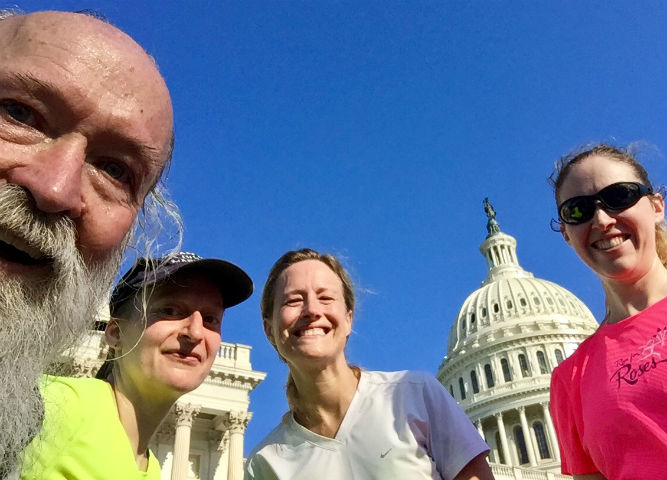 |
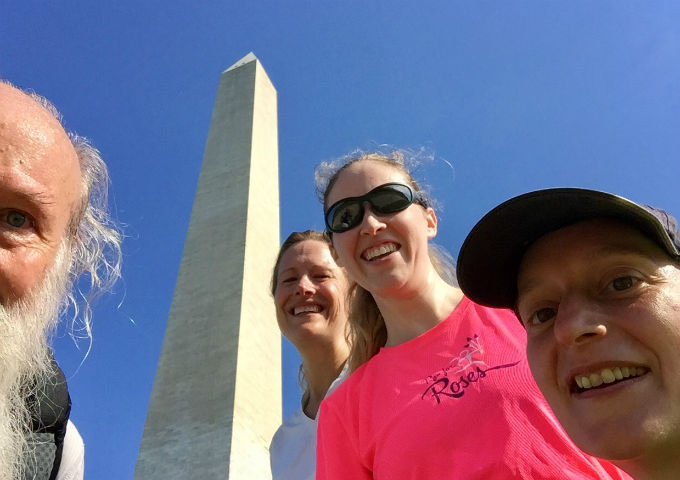 | "Did the ancient Romans run around the Colosseum? Did the Greeks do hillwork to the Acropolis?" we muse on the climb to the 14th Street bridge. Kerry pauses for selfies at Nats Stadium. Kristin suggests we consider closing the loop via a trail along the east bank of the Potomac. |
| A red-winged blackbird perches on the South Capitol St bridge. Cait gets gummy bears at Union Station; Kerry and I snag iced coffee; Kristin goes for an ice cream cone. "Try something new!" counsels the unicorn oracle card drawn last night. We do! | 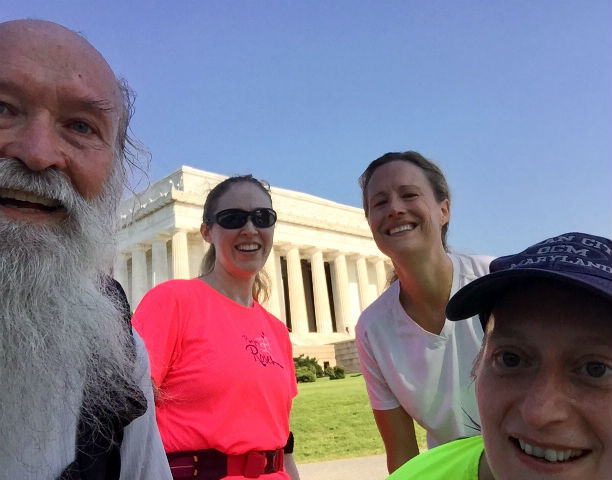 |
(trackfile)
- Thursday, July 13, 2017 at 05:57:26 (EDT)
Humbling thoughts from the introductory pages of John Sterman's textbook Business Dynamics: Systems Thinking and Modeling for a Complex World, starting in the Preface:
IF YOU HAVE A STRONG MATHEMATICS BACKGROUND, FEAR NOT
Realistic and useful models are almost always of such complexity and nonlinearity that there are no known analytic solutions, and many of the mathematical tools you have studied have limited applicability. This book will help you use your strong technical background to develop your intuition and conceptual understanding of complexity and dynamics. Modeling human behavior differs from modeling physical systems in engineering and the sciences. We cannot put managers up on the lab bench and run experiments to determine their transfer function or frequency response. We believe all electrons follow the same laws of physics, but we cannot assume all people behave in the same way. Besides a solid grounding in the mathematics of dynamic systems, modeling human systems requires us to develop our knowledge of psychology, decision making, and organizational behavior. Finally, mathematical analysis, while necessary, is far from sufficient for successful systems thinking and modeling. For your work to have impact in the real world you must learn how to develop and implement models of human behavior in organizations, with all their ambiguity, time pressure, personalities, and politics. Throughout the book I have sought to illustrate how the technical tools and mathematical concepts you may have studied in the sciences or engineering can be applied to the messy world of the policy maker.
... and from Chapter 1, Section 1, a metaphor:
The challenge facing us all is how to move from generalizations about accelerating learning and systems thinking to tools and processes that help us understand complexity, design better operating policies, and guide changes in systems from the smallest business to the planet as a whole. However, learning about complex systems while you also live in them is difficult. We are all passengers on an aircraft we must not only fly but redesign in flight.
(cf. Forecasting Lessons from Systems Dynamics (2017-07-05), ...)
- Wednesday, July 12, 2017 at 04:32:16 (EDT)
~4.7 miles @ ~12.7 min/mi
"This singlet must have shrunk!" I refuse to accept any other explanation for my exposed midriff. Cait laughs and recalls similar shrinkage among her husband's shirts. The Dawn Patrol rambles short on a humid-warm morning, orange-tinged clouds to the east, intermittent welcome west winds. In Pimmit View Park we chase a rabbit that refuses to leave the path.
"He thought they were aliens!" Kristin tells of her young dog's amazement at his first firefly encounter. An azure-hued classic car parked near mile 1 features eye-catching, uh, artwork that depicts the undraped feminine form. Decal or painting, one wonders?
(trackfile)
- Tuesday, July 11, 2017 at 04:35:40 (EDT)
From Chapter 22 ("Time Unfolds") of Subtle Sound: The Zen Teachings of Maurine Stuart:
Not resisting, we breathe in the sound of the rain, of the birds, of the gong, of our feet as we walk on this wonderful squeaky floor—not resisting, we breathe these sounds in, we breathe them out. We dissolve into them, and they into us. This is listening practice, just being present with each sound, whatever it is: cars passing by, a fire engine zooming along making a terrific noise, every kind of sound. Nothing is a disturbance, nothing is an intrusion.
- Monday, July 10, 2017 at 04:12:30 (EDT)
~10.2 miles @ ~12.6 min/mi
"The hair style of #2 - NOT a runner!" Celebrity-marathoner Dean Karnazes was on the new "To Tell the Truth" TV game show a few months ago, and Dean Palmer quotes the reason one panelist gave for voting against him. We dash along Rock Creek Trail together, pace ~10 min/mi for the first 4 miles today. Parking at KenGar overflows into the neighborhood as a training group arrives early on a hot and hyper-humid morning.
"Rats with hooves!" a lady describes the two big deer who stand by the path. "Four-legged locusts!" Ken and Rebecca catch us, then Gayatri and Barry. We turn back to pick up Sako and Win. A side path beckons at Dewey Park; Gayatri and I explore it until spider webs, poison ivy, and the threat of ticks force us to retreat. Further downstream I investigate it from the opposite direction. We finish up with a sweaty hill climb.
(trackfile)
- Sunday, July 09, 2017 at 04:27:44 (EDT)
Eugenia Cheng is a thoughtful person, a mathematician, a musician/artist, and a writer (cf. her book Cakes, Custard, and Category Theory). In mid-2017 she spoke on a podcast "Greater Than Code" with Coraline Ada Ehmke, Rein Henrichs, Jessica Kerr about important issues of society, archetypal male/female styles, collaboration, organization, and life:
... I decided that we should have new words to replace masculine and feminine and I brainstormed with an amazing friend of mine for ages about this. We finally came up with ingressive and congressive. Ingressive is to replace masculine and congressive is to replace feminine.
The idea is that ingressive is about going into things and not being waylaid by what people think or by emotions and congressive is about bringing people with you and bringing people together and unifying and making connections between things. ...
and
... broadly speaking, I've come to think that congressive behavior is basically better for society but that ingressive behavior is rewarded more by society because society is based on competition. It's based on how you present yourself so for things like competing for a job, you have to be ingressive to put yourself forward for promotion and to talk about how great you are. Whereas, when you're actually doing some work with people, then it's really helpful to be congressive because then you bring people together, you understand people. ...
and
... There are ways to be congressive and deal with ingressive behavior. It's just hard and I'm figuring them out as I go along and what I hope is that we can gradually getting more in touch with our congressive side and find a way of diffusing ingressive behavior so that congressive behavior can be more valued because the trouble is that ingressive behavior is kind of louder. It's like the fact that the loud people are always the loudest. They're the ones who get heard. While ingressive people aren't in charge of everything, they will continue to reward ingressive behavior as well. I think that is one of the big reasons why women are underrepresented in politics, in management, in academia, and dare I say it, also in crime because I suspect that ingressive behavior is also related to really, really being focused on winning and not really caring about losing ...
and
... the ingressive people aren't put off by being wrong. They're really spurred on by the joy of being right and that, I think means that there is an accidental filter that puts off congressive people and keeps ingressive people in. I think this could lead to why women are still underrepresented in math. I think that we can change that by presenting math in a congressive way early on, instead of an ingressive way. There's so many mathematical outreach activities that I look at them and go, "That's really ingressive and there are ways that you could turn it into something congressive." But you know, if you said that about boys and girls instead of ingressive and congressive, you would sound ridiculous because then you would end up saying, "This outreach activity appeals to boys and not girls." Doesn't that sound stupid? Whereas ...
and
... There are two kinds of argument — well, there are lots of kind of argument — but there's an ingressive argument where everyone is trying to win and the way you win is by showing that you're clever than the other person and that they're wrong. Whereas, I really like congressive arguments where the aim is to understand something. Then it doesn't matter who is right and who's wrong because whatever happens, you learn something and you've understood it. ...
and
... I think a lot of the writing about how women can be successful is about teaching them how to be ingressive so that they can compete with men. That works for some people and I've met plenty of really ingressive women who become successful at that and who are proud of themselves for having done it. But I think there's another way, which is to find ways of congressively dealing with ingressive behavior and I fantasize, and this is a kind of abstract dream again, where I fantasize about not an all-women institution. I've worked in all-women institutions and all that happens is there are ingressive and congressive women and the ingressive women take control and that's that.
What I fantasize about is an all-congressive institution, where everyone is chosen because they're congressive and everyone works together congressively and though, staff are working at congressive, I'm not quite sure what it would be like because it so far from things that I know. But I've tried to set some things up small microcosms like that for myself. For example, any class I teach is very, very congressive. I try to make it explicitly congressive so that it's all about understanding things. ...
and
... if we think ingressively, then we think about blame. But if we think congressively, then we see a system as a whole. Then we realize that it's a system that we should be thinking about, not the individuals. I think that's a congressive way of thinking. ...
(cf. Proverbs, Rules, Bureaucracies (2000-07-12), Talent for Collaboration (2001-12-08), Keith Johnstone Improv Quotes (2012-12-06), Mantra - Yes, and... (2016-01-30), ...)
- Saturday, July 08, 2017 at 05:20:40 (EDT)
~10.4 miles @ ~12.8 min/mi
"I thought you were supposed to be pulling me along!" Barry and I take turns taking the hills of Leland St on a warm-and-humid morn. Six rabbits nibble front lawn grass; three chipmunks dance across the road. We follow a narrow trail along the west bank of Rock Creek, brush against nettles, and pause to rinse legs using water from our bottles.
"Mundanes might freak out at the sight. Weak ones could swoon," I explain, as I put my singlet back on when we return to civilization or what passes for it. Earlier, on the solo run from home to our rendezvous I push hard and do mile two in 8.3 minutes by the GPS. Waiting for others to arrive I meander around downtown Bethesda. An exhausted runner sits outside a shop and catches her breath. The verge of the art-fountain-sculpture quotes Winnie the Pooh: IT IS MORE FUN TO TALK WITH SOMEONE WHO DOESN'T USE LONG, DIFFICULT WORDS BUT RATHER SHORT, EASY WORDS LIKE "WHAT ABOUT LUNCH?"
Yes!
(trackfile)
- Friday, July 07, 2017 at 04:32:39 (EDT)
~6.5 miles @ ~11.7 min/mi
"You carried those shoes across the Atlantic Ocean just to run with us? Thank you!" As rain begins to patter down the Dawn Patrol welcomes Dr Amber, in town for work and up early on the last day before her return flight. Kerry reports on a long night of high school graduation parties. Cait's raccoon trap caught two critters yesterday. We meander through Langley Forest and assess the local mansion construction boom. Snaky roots threaten to snag ankles on dirt cut-throughs between neighborhoods; pathways are narrowed by flourishing bushes. We pause at the Heather Brook Court statue of mermaids to send a group selfie to Dr Kristin, who can't join us today.
(trackfile)
- Thursday, July 06, 2017 at 06:58:22 (EDT)
From the textbook Business Dynamics: Systems Thinking and Modeling for a Complex World by John D Sterman, Section 16.5 ("Implications for Forecast Consumers"):
The results suggest important lessons for forecasters and especially for managers and decision makers who must choose which forecasts and forecasting methods to buy.
First, most forecasts are not very good. Forecasts are most accurate when the underlying dynamics are stable, as when predicting the influence of regular phenomena such as seasonal variations. But forecasting methods are particularly poor when there are changes in trends, noise, and other sources of turbulence. These are precisely the times when people are most interested in forecasts.
Second, most forecasting methods frequently miss changes in trends and turning points in cycles, lagging behind rather than anticipating them. The systematic errors in forecasts of inflation, commodity prices, energy use, and other variables strongly suggest adaptive expectations and simple trend extrapolation often dominate professional forecasts. These methods do correct errors over time, but because they involve smoothing past data, they inevitably introduce delays that cause the forecasts to miss key turning points and shifts in growth rates.
Third, smoothing and extrapolation of the past trend in the variable itself seems to dominate other considerations in forecasting. Though forecasters often claim to (and indeed may) examine a wide range of variables in making their forecasts, past values and past trends strongly anchor their forecasts. The influence of other variables is weak because their connections to the target variable are poorly understood, unstable, noisy, and ambiguous. Forecasters often behave as if they were using simple smoothing and naive extrapolation even when they are using complicated formal models. They adjust the parameters and values of exogenous inputs until the output of the model is "reasonable," that is, until it matches their intuition. Intuition, however, is biased by a variety of judgmental heuristics and tends to be strongly anchored to recent trends.
Fourth, forecasters tend to underestimate uncertainty in their forecasts, often failing to provide a range, alternative scenarios, or a list of factors to which their forecasts are sensitive (see the overconfidence bias, section 8.2.5).
How then can managers improve the value they get from forecasts? Fight against the overconfidence bias by explicitly challenging assumptions and asking how your expectations might be wrong (for practical examples, see Russo and Schoemaker 1989). Require forecasters to document their assumptions, make their data sources explicit, and specify the methods they are using. Don't allow forecasters to use add factoring (chapter 21 discusses standards for replicability and rigor in modeling).
Even so, improving forecast accuracy is difficult. The best way to improve the benefit/cost ratio of forecasting is to reduce the cost. The projections of expensive forecasting services and models tend to be dominated by smoothing and trend extrapolation. Managers can save a great deal of money by smoothing and extrapolating the data themselves. Forecast accuracy may not improve, but the cost of acquiring the forecasts will fall.
Finally, focus on the development of decision rules and strategies that are robust to the inevitable forecast errors. The real value of modeling is not to anticipate and react to problems in the environment but to eliminate the problems by changing the underlying structure of the system. Modelers and their clients should be designers, not diviners. In the words of Antoine de Saint-Exupèry, "As for the future, your task is not to foresee, but to enable it."
(cf. Transient Behavior (1999-05-11), Fifth Disciplinarians (2000-09-10), ...)
- Wednesday, July 05, 2017 at 04:49:55 (EDT)
~7.3 miles @ ~13.7 min/mi
"Now I'm just smiling!" It's a natural reaction to the sight of me carrying an ultra-cute plush toy Peter Rabbit under my arm for the last few miles of today's Dawn Patrol. The big doll is standing by Dempsey St with a sign that says "FREE", so of course someone must rescue it! The Dawn Patrol rambles toward a rising sun, thankful that the morning isn't as warm and humid as the day will soon be. Opalocka Dr demands a detour to admire the bungalows. Three real bunnies nibble front lawn grass.
"Don't eat that bead! Don't lick his ear!" Kristin describes attempts to curb the over-enthusiastic antics of her family's puppy. Cait tells of testing a slip-n-slide and reports on the status of raccoon-trapping activities in her yard.
(trackfile)
- Tuesday, July 04, 2017 at 06:25:02 (EDT)
The Big Problem — the root cause of so many mistakes and fights and wasted resources — is the natural human tendency to imagine that beliefs are true or false. This is (almost always) wrong:
Belief is a Knob
Not a Switch! |
Outside of definitions and math (and even within much math) there are degrees of certainty, odds and likelihoods, ranges of numbers rather than specific answers, errors distributed across a zone, a universe of multiple possibilities.
When new information comes in — evidence — it's vital to update beliefs rather than throw them away. "Turn the Knob", more or less, based on the balance between the weight of prior knowledge and the strength of new data. That's Bayes Theorem, in a qualitative nutshell.
Don't be too sure!
(cf. Statistics - A Bayesian Perspective (2010-08-13), Introduction to Bayesian Statistics (2010-11-20), Fallibilism (2013-05-14), Adventure of the Bayesian Clocks - Part One (2013-12-04), Adventure of the Bayesian Clocks - Part Two (2014-01-05), ...)
- Monday, July 03, 2017 at 03:50:44 (EDT)
~6.7 miles @ ~13.6 min/mi
"And they just flat-out lied!" Trail talk today includes lots of head-shaking and face-palming, as we analyze how not to handle professional issues. The Dawn Patrol confirms a great new cut-through discovered last week between Windy Hill, Elmwood, and West Langley communities. Kristin spies two rabbits; Cait and I are fortuitously color-coordinated in orange, lime, and black gear. Kerry's neighbor greets her and recommends Greenberry's coffee, but the line at Starbucks is short and iced java there gives a quick boost for the final miles.
(trackfile)
- Sunday, July 02, 2017 at 05:44:32 (EDT)
~13.3 miles @ ~15.2 min/mi
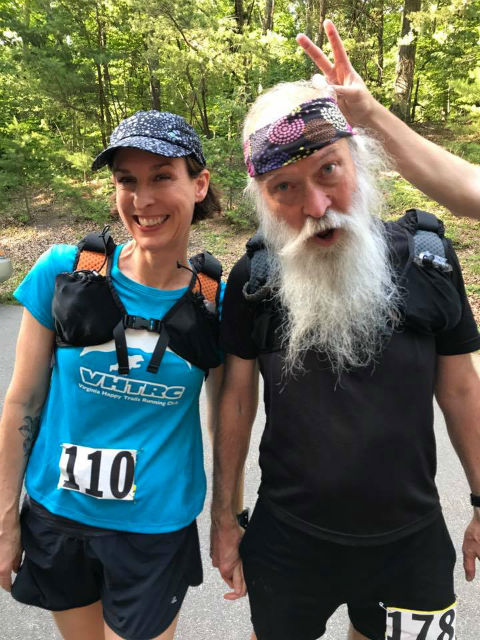 | "Banana!" says John Hord at mile 8, running a few steps behind me. "Is that the safeword?" I ask. "Will it stop the suffering? Banana! Banana!" We're doing the OSS/CIA 50 miler, a night race that begins on a warm and humid Saturday evening in Prince William Forest Park. Dr Stephanie sets a fast pace over rocks and roots, 13-15 min/mi, a bit too brisk for me to sustain given temperature and terrain. This is a free run for me, since I won (if "won" is the right word!) an entry in the DC Capital Striders lottery a few months ago. Charlie Poffenberger introduces himself; we chat and share running and family stories. Dipak Bhattacharyya, who played leapfrog with me along the C&O Canal towpath six weeks ago, greets us. With a few dozen others we take the 6pm early start, so headlamps aren't needed until mile 9. Ever-cheerful Gary Knipling gives us fist-bump encouragement. "Bad news!" Stephanie reports at the 2 hour point. Her ankle injury from a Maryland Heights fall a couple of months ago has healed, but the other foot now is hurting, and getting worse, possibly with plantar fasciitis. With a big race next month, now is not the time for further injury. We tread cautiously for a few more miles, witness a copperhead snake slithering off the path (I wanted to take a selfie with it, but it got away!), and at the next aid station withdraw from the race. Toni Aurelio accepts our bibs, and Bernard Pesjak gives us a ride back to the starting line. A beautiful moon rises in front of us as we drive home, and reminds us what's more important than finishing a race. |
(trackfile)
- Saturday, July 01, 2017 at 04:55:52 (EDT)
~4.5 miles @ ~12.2 min/mi
"Or I could have shoved you into that pile of dog poop?" On the Paxton Road sidewalk near Pimmit Drive: stumble, stagger, nearly-recover, then fall. Oops! Kristin considers giving me a nudge toward the lawn but wisely refrains. I aim for grass but miss.
Thankfully, the tumble results in nothing worse than scraped knee and knuckles plus a bit of hip rash. Superman ring on badge chain cracks iPhone screen, but a new model is due out in a few months. Kerry and Cait offer condolences. We reminisce about injuries. The Dawn Patrol spies four front-yard rabbits as drizzle starts and stops.
(trackfile)
- Friday, June 30, 2017 at 04:40:27 (EDT)
Uncertainty
Kindness
Peace
Hope |
- Uncertainty - realizing that knowledge is limited, and that judgments always need to be tempered with caution
- Kindness - going beyond what's required, to act gently and helpfully toward other living creatures
- Peace - choosing not to return violence to violence, but rather to strive for harmony and calm
- Hope - believing that things will get better and good will triumph, and that in the long run love wins
(cf. Underappreciated Ideas (1999-07-06), ...)
- Thursday, June 29, 2017 at 05:15:17 (EDT)
~8.3 miles @ ~12.7 min/mi
"Welease Wodewick!" and then "A hospital? It's a big building with patients, but that's not important right now." Barry quotes from the films Life of Brian and Airplane; I recite a bit of Gerard Manly Hopkins. On a sultry Sunday afternoon we meet at General Getty Park and ramble up Sligo Creek Trail. At Colt Terrace Neighborhood Park we pause to exercise on the children's playground equipment, then hook back via neighborhood streets to return downstream. A big deer peers at us, and a chipmunk dashes across the path. My lunch with DS Merle at the Mandalay Cafe — Burmese samosas, KaYann Thee Hin (eggplant onion curry), and Tofu Ohnno Hin (with coconut-cream curry) — was a tasty but perhaps suboptimal pre-run repast.
(trackfile)
- Wednesday, June 28, 2017 at 04:15:04 (EDT)
For back issues of the ^zhurnal see Volumes
v.01 (April-May 1999),
v.02 (May-July 1999),
v.03 (July-September 1999),
v.04 (September-November 1999),
v.05 (November 1999 - January 2000),
v.06 (January-March 2000),
v.07 (March-May 2000),
v.08 (May-June 2000),
v.09 (June-July 2000),
v.10 (August-October 2000),
v.11 (October-December 2000),
v.12 (December 2000 - February 2001),
v.13 (February-April 2001),
v.14 (April-June 2001),
0.15 (June-August 2001),
0.16 (August-September 2001),
0.17 (September-November 2001),
0.18 (November-December 2001),
0.19 (December 2001 - February 2002),
0.20 (February-April 2002),
0.21 (April-May 2002),
0.22 (May-July 2002),
0.23 (July-September 2002),
0.24 (September-October 2002),
0.25 (October-November 2002),
0.26 (November 2002 - January 2003),
0.27 (January-February 2003),
0.28 (February-April 2003),
0.29 (April-June 2003),
0.30 (June-July 2003),
0.31 (July-September 2003),
0.32 (September-October 2003),
0.33 (October-November 2003),
0.34 (November 2003 - January 2004),
0.35 (January-February 2004),
0.36 (February-March 2004),
0.37 (March-April 2004),
0.38 (April-June 2004),
0.39 (June-July 2004),
0.40 (July-August 2004),
0.41 (August-September 2004),
0.42 (September-November 2004),
0.43 (November-December 2004),
0.44 (December 2004 - February 2005),
0.45 (February-March 2005),
0.46 (March-May 2005),
0.47 (May-June 2005),
0.48 (June-August 2005),
0.49 (August-September 2005),
0.50 (September-November 2005),
0.51 (November 2005 - January 2006),
0.52 (January-February 2006),
0.53 (February-April 2006),
0.54 (April-June 2006),
0.55 (June-July 2006),
0.56 (July-September 2006),
0.57 (September-November 2006),
0.58 (November-December 2006),
0.59 (December 2006 - February 2007),
0.60 (February-May 2007),
0.61 (April-May 2007),
0.62 (May-July 2007),
0.63 (July-September 2007),
0.64 (September-November 2007),
0.65 (November 2007 - January 2008),
0.66 (January-March 2008),
0.67 (March-April 2008),
0.68 (April-June 2008),
0.69 (July-August 2008),
0.70 (August-September 2008),
0.71 (September-October 2008),
0.72 (October-November 2008),
0.73 (November 2008 - January 2009),
0.74 (January-February 2009),
0.75 (February-April 2009),
0.76 (April-June 2009),
0.77 (June-August 2009),
0.78 (August-September 2009),
0.79 (September-November 2009),
0.80 (November-December 2009),
0.81 (December 2009 - February 2010),
0.82 (February-April 2010),
0.83 (April-May 2010),
0.84 (May-July 2010),
0.85 (July-September 2010),
0.86 (September-October 2010),
0.87 (October-December 2010),
0.88 (December 2010 - February 2011),
0.89 (February-April 2011),
0.90 (April-June 2011),
0.91 (June-August 2011),
0.92 (August-October 2011),
0.93 (October-December 2011),
0.94 (December 2011-January 2012),
0.95 (January-March 2012),
0.96 (March-April 2012),
0.97 (April-June 2012),
0.98 (June-September 2012),
0.99 (September-November 2012),
0.9901 (November-December 2012),
0.9902 (December 2012-February 2013),
0.9903 (February-March 2013),
0.9904 (March-May 2013),
0.9905 (May-July 2013),
0.9906 (July-September 2013),
0.9907 (September-October 2013),
0.9908 (October-December 2013),
0.9909 (December 2013-February 2014),
0.9910 (February-May 2014),
0.9911 (May-July 2014),
0.9912 (July-August 2014),
0.9913 (August-October 2014),
0.9914 (November 2014-January 2015),
0.9915 (January-April 2015),
0.9916 (April-July 2015),
0.9917 (July-September 2015),
0.9918 (September-November 2015),
0.9919 (November 2015-January 2016),
0.9920 (January-April 2016),
0.9921 (April-June 2016),
0.9922 (June-July 2016),
0.9923 (July-September 2016),
0.9924 (October-December 2016),
0.9925 (January-February 2017),
0.9926 (March-April 2017),
0.9927 (May-June 2017),
0.9928 (June-October 2017),
0.9929 (October-December 2017),
0.9930 (December 2017-March 2018),
...
Current Volume.
Send comments and suggestions to z (at) his.com. Thank you! (Copyright © 1999-2017 by Mark Zimmermann.)














